134 - Elf & Safety
Thursday, January 29, 2015
Although most of what I write about focusses on life and travels in Spain, this blog will ALWAYS keep the name "A Foot in Two Campos" because what I can never leave behind me, wherever I might live, is my innate British outlook and upbringing. So when I see a narrow footpath with a massive drop, completely lacking any kind of fencing, every pore in my oh-so-British body screams "What would Health & Safety have to say about THAT !?!?!" and "THAT wouldn't be allowed in the UK!!!"
Those two sentences were running rampant in my mind at the weekend when I went for a bit of a bimble around Ronda. It's stunning, of course, and this wasn't my first visit. It's easily close enough for a day-visit but I'd decided to stay over and explore the surrounding area a bit.
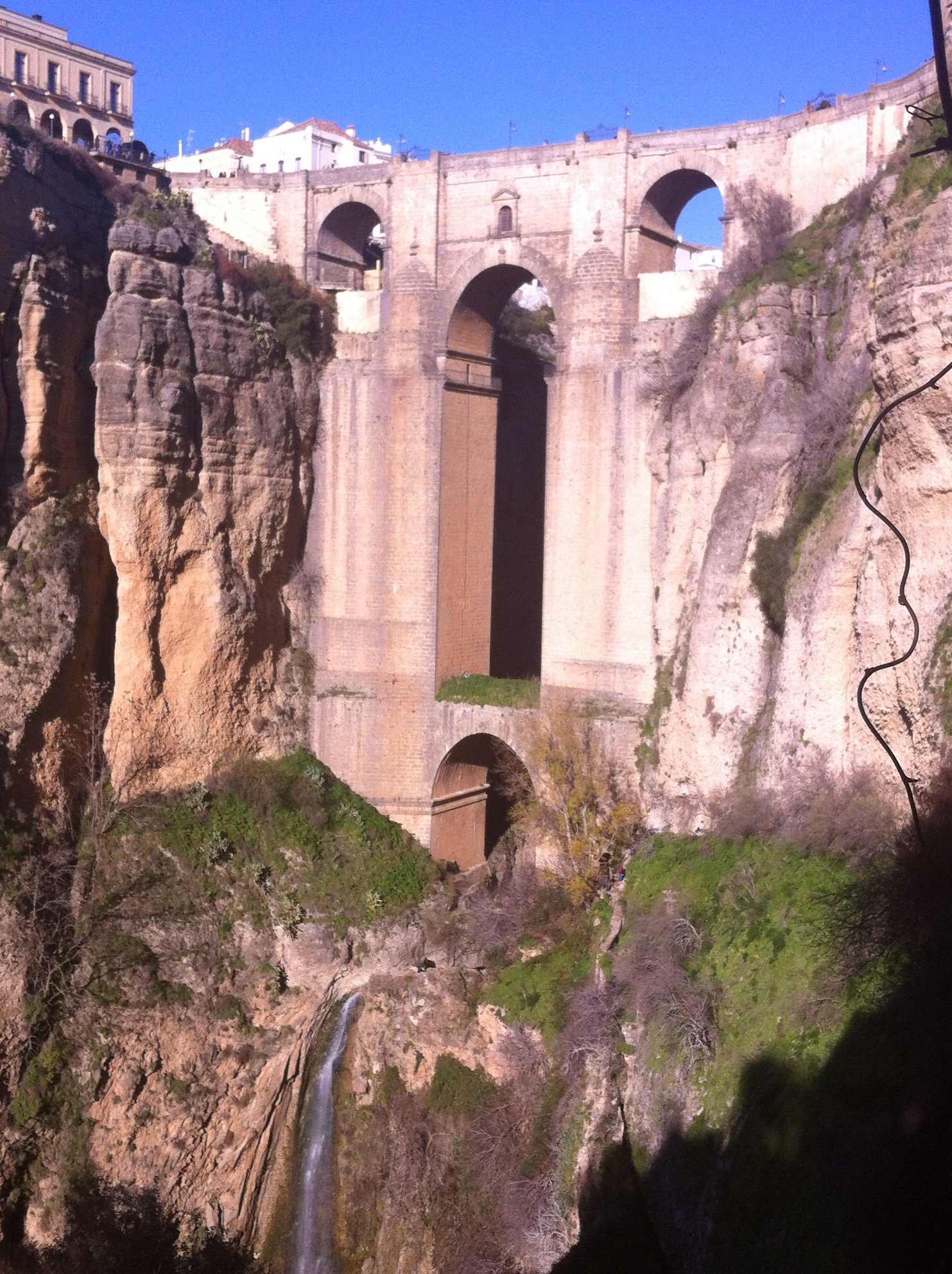 The gorge, cutting right through the centre, is what Ronda is rightfully famous for, 150 metres deep, with a dramatic bridge linking the two halves of the town. Every visitor who has ever been has a similar collection of photos taken from the top. The fit and the intrepid also have photos taken from the bottom. I'm not fit, and not usually particularly intrepid, but the temperature was about right - not too wet (which makes the path slippery), not too sunny (which makes it too hot and airless), and not too cold (which it can be, down there in the narrow shady gorge). The gorge, cutting right through the centre, is what Ronda is rightfully famous for, 150 metres deep, with a dramatic bridge linking the two halves of the town. Every visitor who has ever been has a similar collection of photos taken from the top. The fit and the intrepid also have photos taken from the bottom. I'm not fit, and not usually particularly intrepid, but the temperature was about right - not too wet (which makes the path slippery), not too sunny (which makes it too hot and airless), and not too cold (which it can be, down there in the narrow shady gorge).
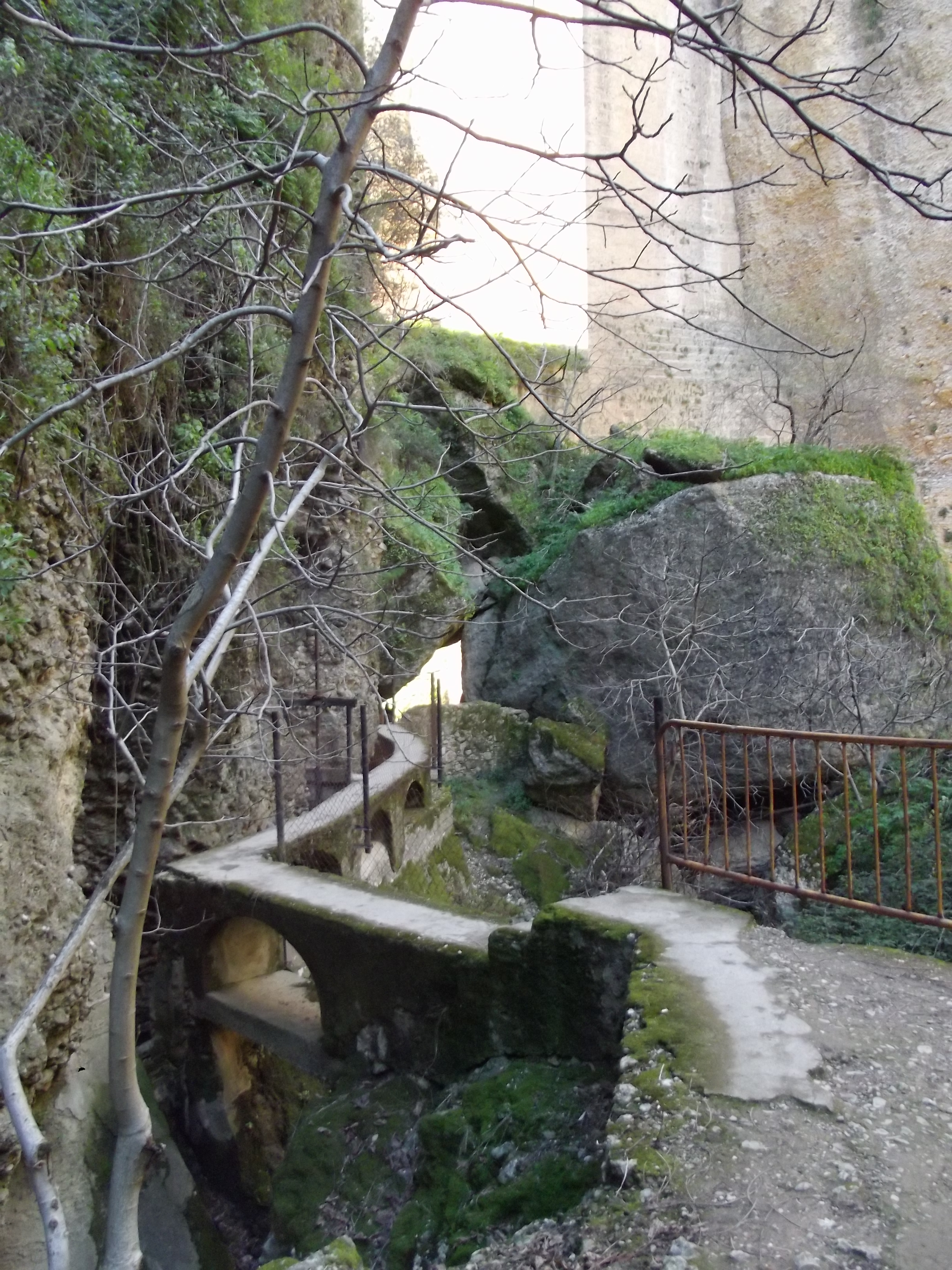 Steps at first, nice and easy. Then a tiled path. Then mud, but a decent width. Then narrower. And rougher. And even narrower. And the drop was steep. And needless to say, there were no barriers. In the trickiest bits, there were occasional lengths of wire hammered into the cliff. At one stage a section had been edged with chicken wire, though this had then collapsed. Lower down, now out of any vestiges of sunshine, and becoming distinctly chilly, and the walker is faced with a narrow concrete footbridge to balance along. You can touch the cliff on your right, though at times it is a little too far to reach and you are on your own. Steps at first, nice and easy. Then a tiled path. Then mud, but a decent width. Then narrower. And rougher. And even narrower. And the drop was steep. And needless to say, there were no barriers. In the trickiest bits, there were occasional lengths of wire hammered into the cliff. At one stage a section had been edged with chicken wire, though this had then collapsed. Lower down, now out of any vestiges of sunshine, and becoming distinctly chilly, and the walker is faced with a narrow concrete footbridge to balance along. You can touch the cliff on your right, though at times it is a little too far to reach and you are on your own.
Taking a deep breath, I tried to imagine I was taking a breathalyser test. "Come on 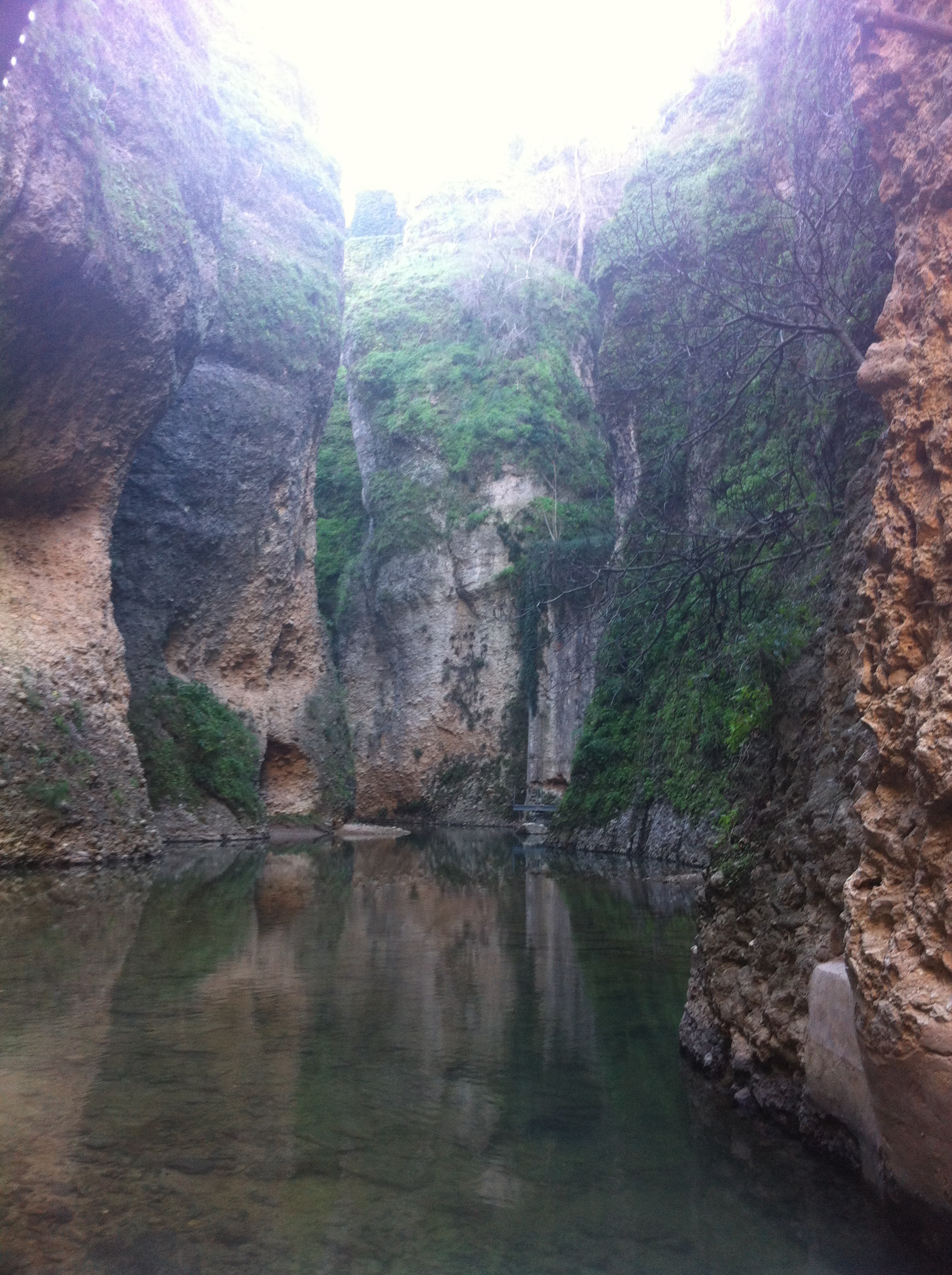 Tamara, you are perfectly capable of walking in a straight line without falling over. Just because there's a steep drop on one side doesn't make it any harder." Yeah, it didn't convince me either. But I got across, and passed under the huge soaring arch to the calm pool of water, shaded and green, catching a shaft of sunlight. High above, out of earshot, the crowds of tourists are up there on the bridge, pointing down, shrieking with the fear of dropping their iPhone. Down here it is almost silent, yet we are in the heart of this busy bustling tourist centre - but hundreds of feet lower, feeling as though it is the centre of the earth's core. Tamara, you are perfectly capable of walking in a straight line without falling over. Just because there's a steep drop on one side doesn't make it any harder." Yeah, it didn't convince me either. But I got across, and passed under the huge soaring arch to the calm pool of water, shaded and green, catching a shaft of sunlight. High above, out of earshot, the crowds of tourists are up there on the bridge, pointing down, shrieking with the fear of dropping their iPhone. Down here it is almost silent, yet we are in the heart of this busy bustling tourist centre - but hundreds of feet lower, feeling as though it is the centre of the earth's core.
Back up at the top I stop for a well-deserved caffeine boost. Dinner that night is at the famous Casa Maria, a little foodie heaven outside the ancient walls, away from the tourist centre. My hotel is central yet quiet and I sleep deeply, though a queue of Health & Safety inspectors tutting and shaking their heads and pointing at the gorge cannot be banished from my dreams. In the end a committee agrees that Ronda should be closed to the public and the gorge filled in with cement to avoid accidents and court cases. When I wake, I remember I am in Spain, so Ronda fortunately remains open, people follow the path down the gorge, and if there is the occasional accident, nobody sues anybody and perhaps another length of tatty chicken wire is nailed temporarily into place.
I take a circuitous route home. I had long wanted to see the Smurf Village, or El Pueblo de los Pitufos. Júzcar is its 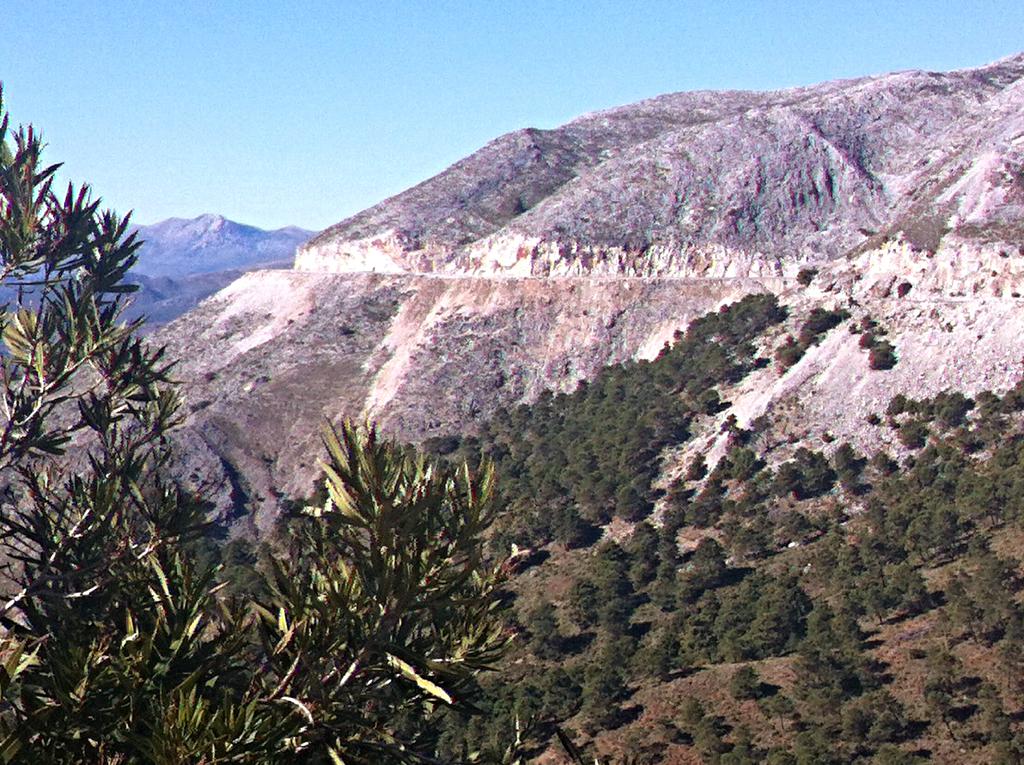 real name, and you would never go through it unless you were going there on purpose - it is on a big horseshoe loop of a road, that starts and ends near Ronda. It's worth the drive - the views are stunning. The road curls round the mountain, hacked into the side of the cliff, an engineering miracle. A little narrow in places, but I am the real name, and you would never go through it unless you were going there on purpose - it is on a big horseshoe loop of a road, that starts and ends near Ronda. It's worth the drive - the views are stunning. The road curls round the mountain, hacked into the side of the cliff, an engineering miracle. A little narrow in places, but I am the 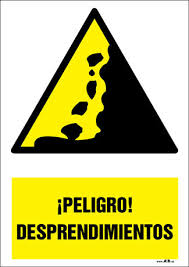 only car I see all morning so I don't have to do any complicated manoeuvres. I duck, at one point (pointlessly, of course) as the cliff overhang seems too close to the car roof. A sign tells me there is danger of rockfalls (peligro de desprendimiento) and a kilometre later signs with pictures of rockfalls are on every corner. A rough hand-scrawled plank of wood informs me that "Cristo salva" - Jesus saves. This is meant to be reassuring but has the opposite effect. only car I see all morning so I don't have to do any complicated manoeuvres. I duck, at one point (pointlessly, of course) as the cliff overhang seems too close to the car roof. A sign tells me there is danger of rockfalls (peligro de desprendimiento) and a kilometre later signs with pictures of rockfalls are on every corner. A rough hand-scrawled plank of wood informs me that "Cristo salva" - Jesus saves. This is meant to be reassuring but has the opposite effect.
Driving lower into the valley, surrounded by jaw-dropping views, I reach Júzcar. They filmed the 2011 Smurfs movie there, and paid each householder a handsome sum to be allowed to 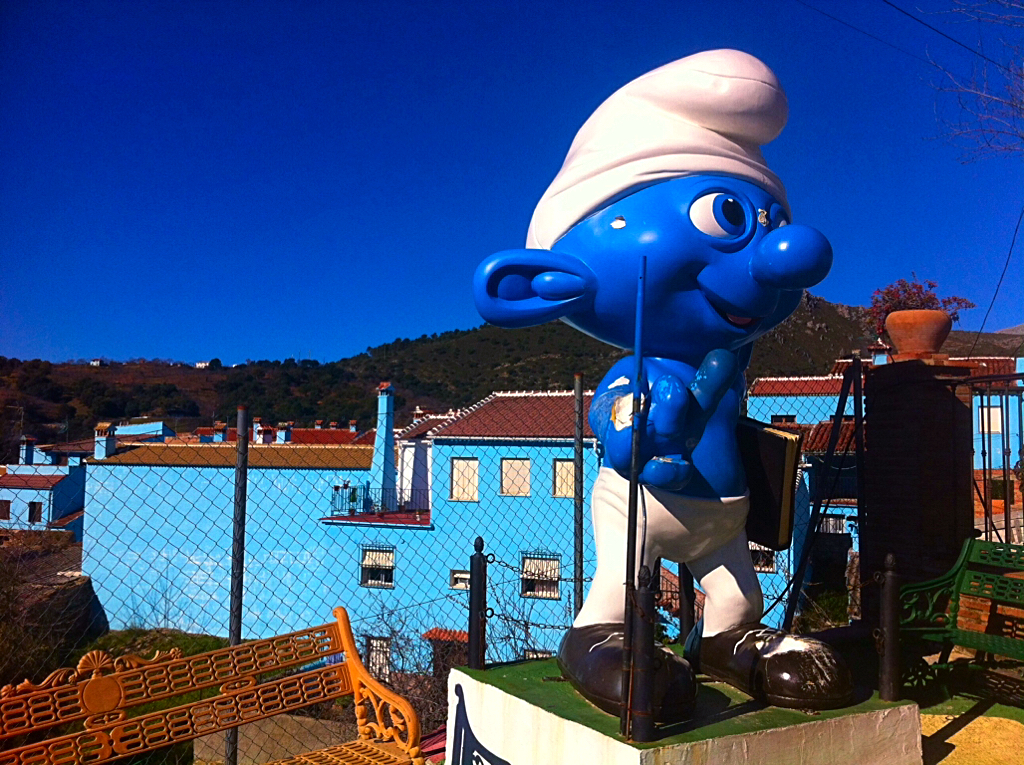 paint the entire village Smurf-blue. The deal was that at the end of filming, they would paint everything back to its original white, leaving it all in better condition than before. But just before the end, the villagers held a vote, and decided to keep it blue. So instead of tons of white paint being delivered, they were supplied with if not a lifetime's supply then at least a good few coats-worth of the Smurf blue paint. Since then a few households have rebelled and gone back to white, but the majority have remained blue, and the village now has a children's playground and a large Smurf statue, courtesy of the film company, plus a regular trickle of tourists who make the pilgrimage to take their photos, have a quick drink at the one bar, and leave. paint the entire village Smurf-blue. The deal was that at the end of filming, they would paint everything back to its original white, leaving it all in better condition than before. But just before the end, the villagers held a vote, and decided to keep it blue. So instead of tons of white paint being delivered, they were supplied with if not a lifetime's supply then at least a good few coats-worth of the Smurf blue paint. Since then a few households have rebelled and gone back to white, but the majority have remained blue, and the village now has a children's playground and a large Smurf statue, courtesy of the film company, plus a regular trickle of tourists who make the pilgrimage to take their photos, have a quick drink at the one bar, and leave.
My home town in Dorset is blessed or cursed in a similar way. A steep cobbled street in the centre of Shaftesbury 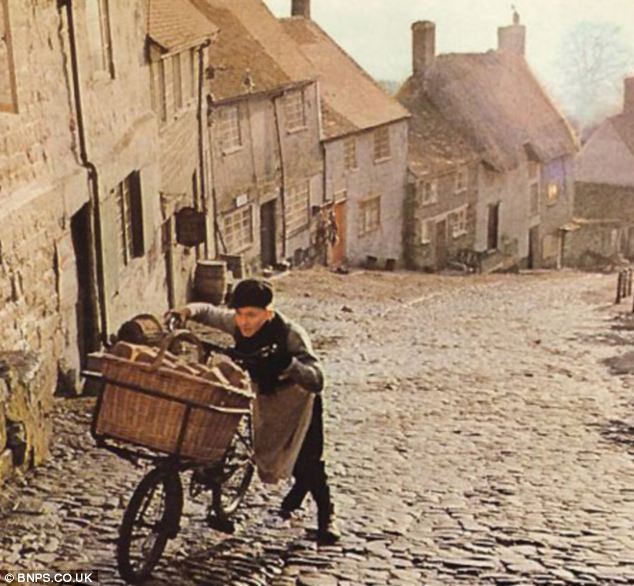 became famous as "the Hovis Hill" after the 1973 bread advert with the boy pushing the baker's bike up the hill. Tourists pile off the coaches, walk 15 yards to the top of the slope, take their pictures, maybe have a coffee, and leave. They are invaluable to the town's economy, and a right royal pain at times to some residents. And those who live on the famous hill street cannot put up satellite dishes or anything that demonstrates modernity, as film and tv rights bring useful revenue. became famous as "the Hovis Hill" after the 1973 bread advert with the boy pushing the baker's bike up the hill. Tourists pile off the coaches, walk 15 yards to the top of the slope, take their pictures, maybe have a coffee, and leave. They are invaluable to the town's economy, and a right royal pain at times to some residents. And those who live on the famous hill street cannot put up satellite dishes or anything that demonstrates modernity, as film and tv rights bring useful revenue.
But at least nobody in Shaftesbury had their house painted blue or was left feeling that they now live in a permanent children's playground or elf theme park.
© Tamara Essex 2015 http://www.twocampos.com
 1
Like
Published at 6:55 PM Comments (5)
1
Like
Published at 6:55 PM Comments (5)
133 - Seas of White
Thursday, January 22, 2015
I hadn't counted on Almería being quite so different. It has some lovely parts, but ¡joder! it's bleak! In every direction, the sun glistened on nothing but seas of white. 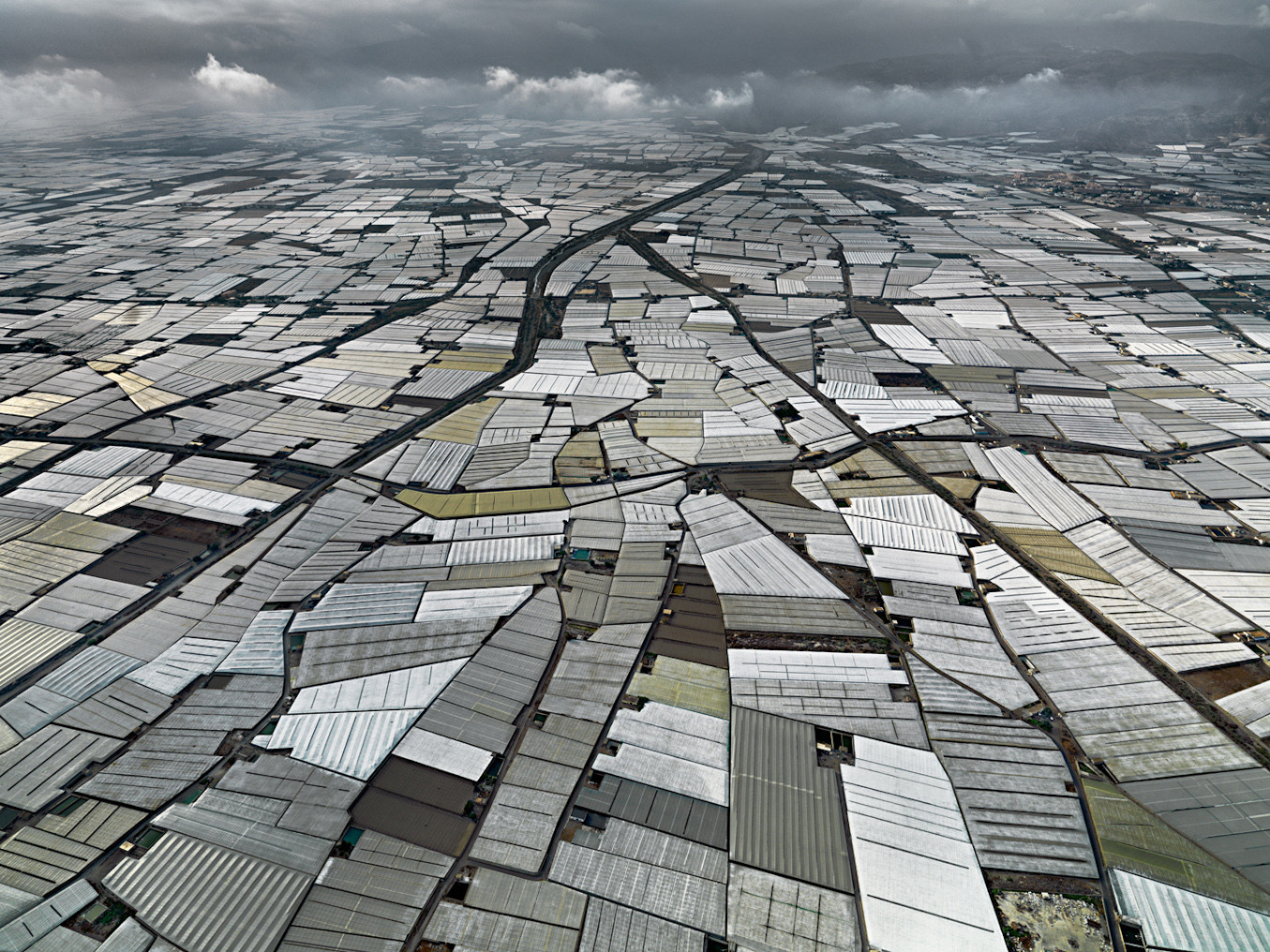 White plastic poly-tunnels, stretching further than could be imagined. A hundred miles, just poly-tunnels. White plastic poly-tunnels, stretching further than could be imagined. A hundred miles, just poly-tunnels.
Some orderly, with processing factories breaking the monotony, and mini shanty towns for the immigrant workers. Others shambolic, with tattered plastic walls and tops, subsistence farming for a family, in the middle of mass production. Not dissimilar to what I'd seen over the Zafarraya Pass, but seriously, they go on forever in Almería.
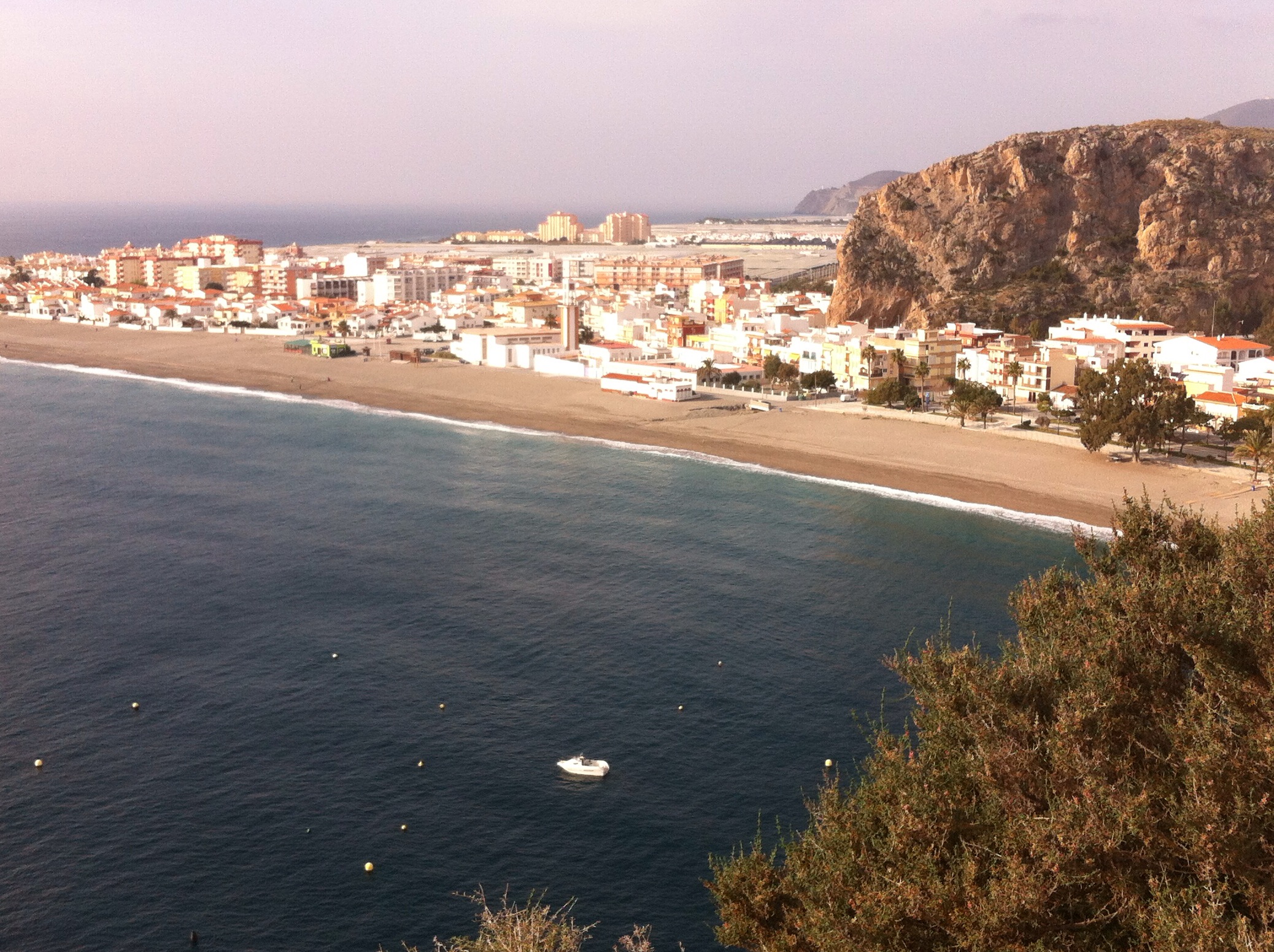 I stopped for lunch in Roquetas del Mar. It's a strange place of two halves - by the seafront and on the main street a sea of white faces, owners of holiday apartments, groups of older people taking advantage of the winter all-inclusive rates. A kilometre or two back from the sea and the poly-tunnels begin again, and driving is precarious as you skirt a river of black men on pushbikes, cycling between their crowded accommodation and the fields or canning plant, swerving around the potholes. Whether the two halves mingle anywhere is unclear, unlikely. I stopped for lunch in Roquetas del Mar. It's a strange place of two halves - by the seafront and on the main street a sea of white faces, owners of holiday apartments, groups of older people taking advantage of the winter all-inclusive rates. A kilometre or two back from the sea and the poly-tunnels begin again, and driving is precarious as you skirt a river of black men on pushbikes, cycling between their crowded accommodation and the fields or canning plant, swerving around the potholes. Whether the two halves mingle anywhere is unclear, unlikely.
On to Cabo de Gata. The map is confusing - it seems to me that the road is closed after the lighthouse. A question in a bar confirms it, that after the visit I will have to go an hour's drive around, to reach a point just a few kilometres away over the hill. I head towards the narrow mountain road to the lighthouse, but on a bend I am met with a sea of white camper-vans all parked up beside the road. A Guardia Civil police officer flags me down and explains that the road is closed. Confused, I say that I knew that, but surely I could get as far as the lighthouse? No, completely closed, he explains, due to roadworks, but it will open at 4pm. He can see my frustration and indecision. "It's worth it", he smiles - "It's REALLY pretty!"
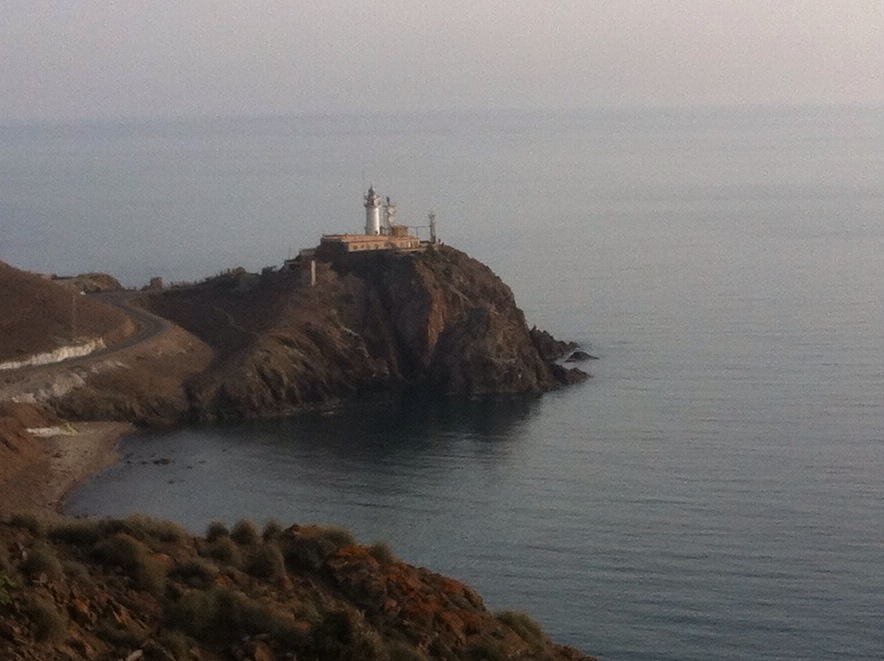 Back to the bar for another coffee to wait out the half hour. Bang on four I head back up. My friendly GC officer is still there but this time waves me through. He's right, it IS worth the effort. The lighthouse is functional rather than pretty, but it is a dramatic spot - stark volcanic hills behind, rocky cliffs and a sea of white-topped waves. Back to the bar for another coffee to wait out the half hour. Bang on four I head back up. My friendly GC officer is still there but this time waves me through. He's right, it IS worth the effort. The lighthouse is functional rather than pretty, but it is a dramatic spot - stark volcanic hills behind, rocky cliffs and a sea of white-topped waves.
I turn back and wind down again, and follow the sat-nav inland and eastwards. The hotel to which I am heading is remote, and gave its situation in Westings and Northings, minutes and seconds. I was accustomed to those when hill-walking with maps and compass, but it took me a while to work out how to put these numbers into the Tom-Tom. When the sat-nav lady with the appalling pronunciation of Spanish place-names delivered me straight to the front door and into the small car-park, I was impressed.
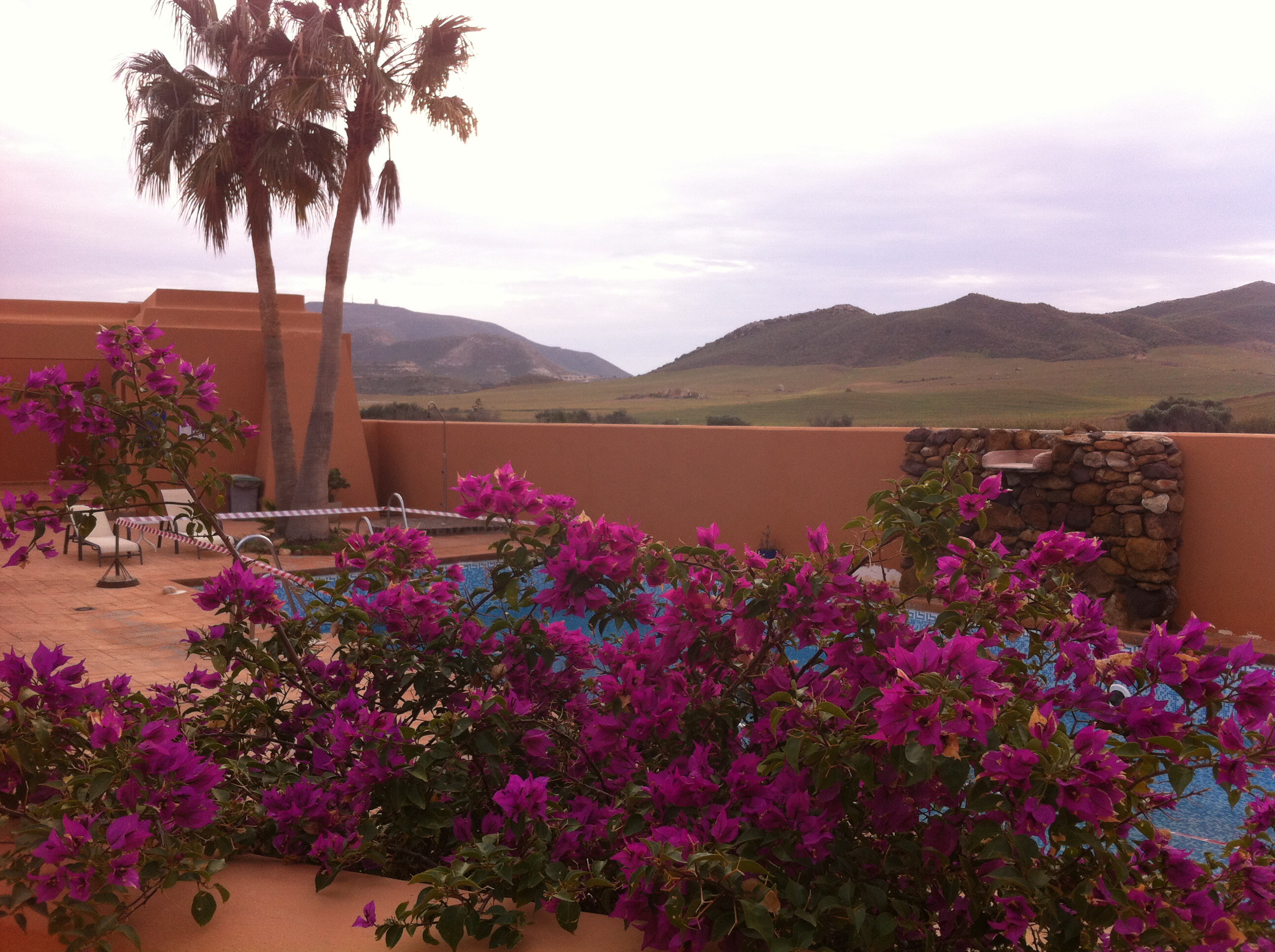 The hotel was an oasis of tranquility. In the middle of nowhere, the only sound was the trickling water in the patio fountain. For no apparent reason, the receptionist threw in a spa circuit with my overnight stay, which was a blissful way to relax. That night the enormous bed was a soft sea of white, the light feather duvet enfolding me as I drifted off listening to the fountain. The hotel was an oasis of tranquility. In the middle of nowhere, the only sound was the trickling water in the patio fountain. For no apparent reason, the receptionist threw in a spa circuit with my overnight stay, which was a blissful way to relax. That night the enormous bed was a soft sea of white, the light feather duvet enfolding me as I drifted off listening to the fountain.
The following day my road turned inland, through the strange volcanic desert 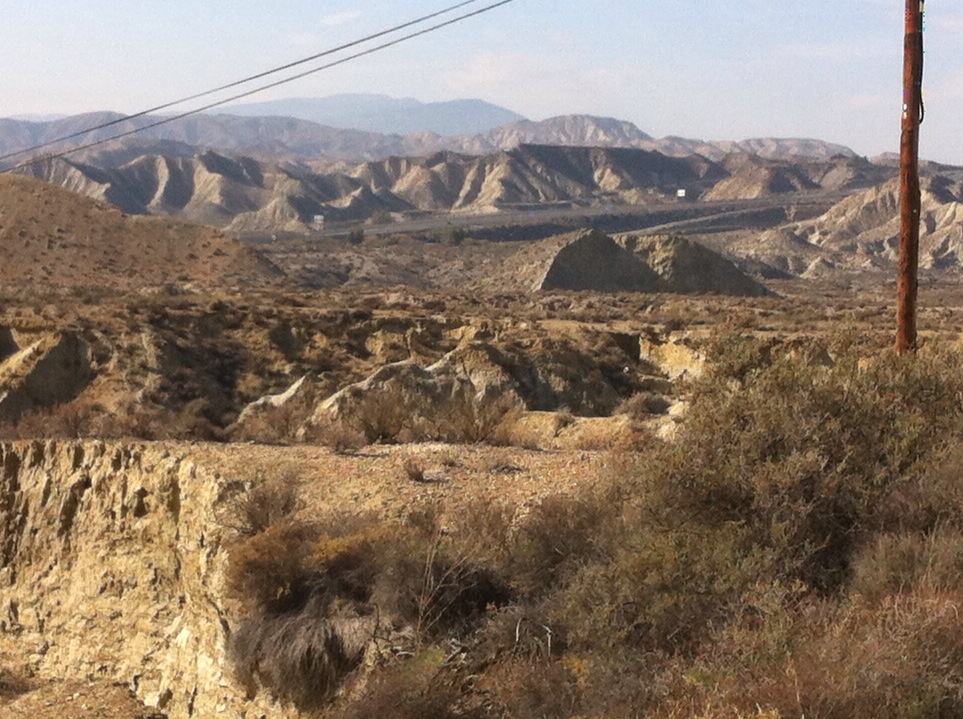 landscape. Roadside restaurants offered "cowboy movie experiences". Old spaghetti western film-sets had been converted to tourist attractions. Driving across the bleak "Desierto de Tabernas" I shivered - it wasn't cold, but it felt very inhospitable. Across the plain, a sea of white wind turbines turned elegantly. The road curled around the north of the Sierra Nevada - a sea of white ice, glistening in landscape. Roadside restaurants offered "cowboy movie experiences". Old spaghetti western film-sets had been converted to tourist attractions. Driving across the bleak "Desierto de Tabernas" I shivered - it wasn't cold, but it felt very inhospitable. Across the plain, a sea of white wind turbines turned elegantly. The road curled around the north of the Sierra Nevada - a sea of white ice, glistening in 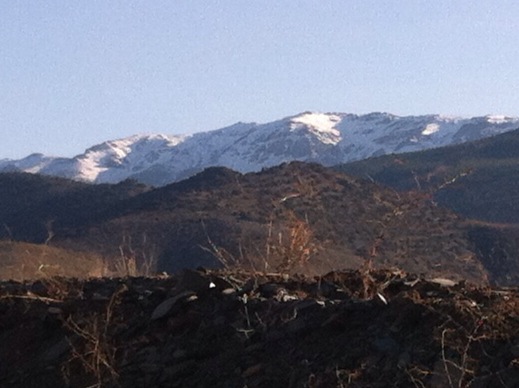 the sun thousands of metres above. the sun thousands of metres above.
Only a two-day break, but it felt like longer. After the miles upon miles of poly-tunnels, then the miles upon miles of desert, the lush green Axarquía with its soft rolling hills and fertile slopes is as welcoming as ever. It's lovely to travel. It's even nicer to return home.
© Tamara Essex 2015 http://www.twocampos.com
THIS WEEK'S LANGUAGE POINT:
Another beginners’ lesson that I seem to have missed is about referring to yourself.
Lo he hecho por mi misma – I did it myself.
¿Lo hiciste tu mismo? – Did you do it yourself?
Ella lo hizo por si misma – She did it herself.
Nosotros lo hicimos por nosotros mismos – We did it ourselves.
Vosotros lo hicisteis por vosotros mismos – You did it yourselves (familiar).
Ellos lo hicieron por si mismos – They did it themselves.
And no, I have no idea why the “tu” form misses out the “por” but I am reliably informed that it does!
 0
Like
Published at 3:06 PM Comments (3)
0
Like
Published at 3:06 PM Comments (3)
132 - Immersion, not Drowning
Thursday, January 15, 2015
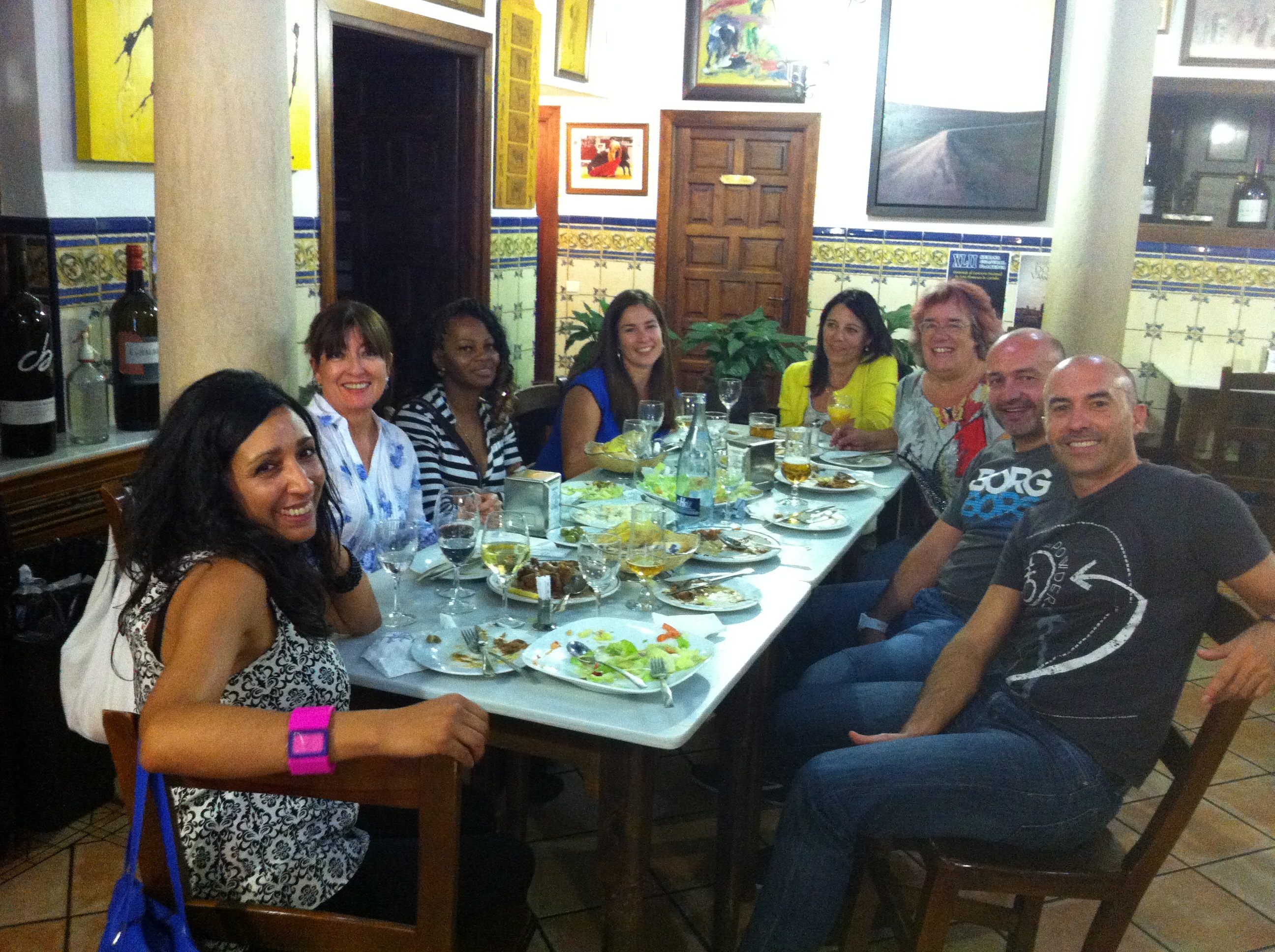 You know you've got a good bunch of people, when the kitty (bote) keeps growing. Nobody wanted to under-pay, everyone was chucking a bit extra in "just in case". The kitty grew. We began by stopping for ice-creams late at night on the way back to the hotel to use it up but it wasn't enough, and in the end the final meal was paid almost entirely out of the remnants of the kitty. You know you've got a good bunch of people, when the kitty (bote) keeps growing. Nobody wanted to under-pay, everyone was chucking a bit extra in "just in case". The kitty grew. We began by stopping for ice-creams late at night on the way back to the hotel to use it up but it wasn't enough, and in the end the final meal was paid almost entirely out of the remnants of the kitty.
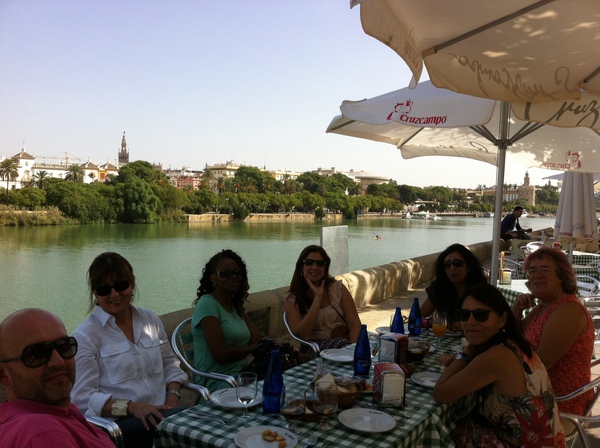 There was a lot of food. The week was advertised as "an immersion into the culture and language of Spain". It seemed that "culture" definitely included food, and we made the most of it. From the generous buffet breakfast in the Córdoba hotel, through a relaxing shared lunch out, to a long evening meal in a traditional Córdobese restaurant, we worked out at the end that we had sampled approximately 60 different Spanish dishes! There was a lot of food. The week was advertised as "an immersion into the culture and language of Spain". It seemed that "culture" definitely included food, and we made the most of it. From the generous buffet breakfast in the Córdoba hotel, through a relaxing shared lunch out, to a long evening meal in a traditional Córdobese restaurant, we worked out at the end that we had sampled approximately 60 different Spanish dishes!
Eight people, from eight distinct cultural backgrounds. Four were native Spanish-speakers, four were students of the language. Rafa, the organiser, was the only Spaniard living in Spain. Carla was from Bolivia, Dora was Peruvian though living in Switzerland, and Irene was born in Holland to Spanish parents. They were there to speak nothing but Spanish for the whole week, and to help and correct us. We the students were Charlene from New York, Frank from Amsterdam, Ursula from Switzerland, and me. Not for the first time I had made the hugely incorrect assumption that most people learning Spanish would be British, and not for the first time I had found myself the only Brit. The diversity added richness and interest, and ensured we were never short of conversation.
Rafa organises these immersion weeks in Málaga and in Córdoba. I had picked Córdoba as it is a city I love but which I know far less than Málaga. Also, I had visited Córdoba once before with Rafa and loved both his knowledge and passion for his native city, and his relaxed informal style.
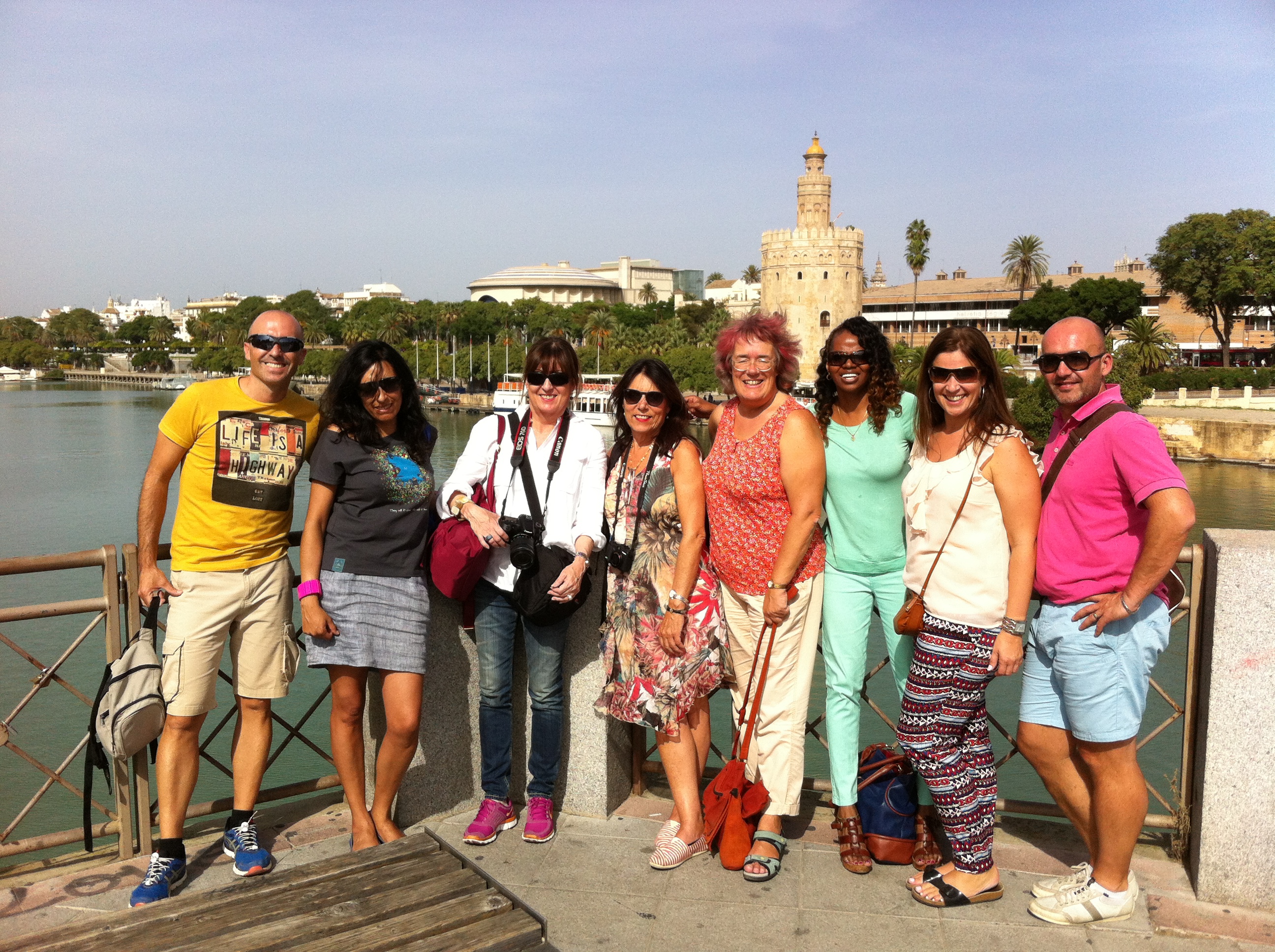 On checking in to the hotel, the welcome pack included the "rules". There were two. Firstly, nothing but Spanish to be spoken. Secondly - enjoy ourselves. Rule two was rather easier than rule one! Well, I say that more because it is the expected quip - actually the whole principle of an immersion week works incredibly well. As we explored the city and the province of Córdoba, listening to tour guides, learning about olive oil and Iberian black-footed pigs, eating in out-of-the-way restaurants, we were indeed immersed in the culture and the language of Spain, and using Spanish from the moment we awoke until the moment we slept became (as it should) the norm. On checking in to the hotel, the welcome pack included the "rules". There were two. Firstly, nothing but Spanish to be spoken. Secondly - enjoy ourselves. Rule two was rather easier than rule one! Well, I say that more because it is the expected quip - actually the whole principle of an immersion week works incredibly well. As we explored the city and the province of Córdoba, listening to tour guides, learning about olive oil and Iberian black-footed pigs, eating in out-of-the-way restaurants, we were indeed immersed in the culture and the language of Spain, and using Spanish from the moment we awoke until the moment we slept became (as it should) the norm.
Of course no visit to Córdoba is complete without a visit to the Mezquita. Since I first saw it about ten years ago, I had been appalled by what I saw as the disgusting, invasive, disrespectful penetrative act of building a Christian 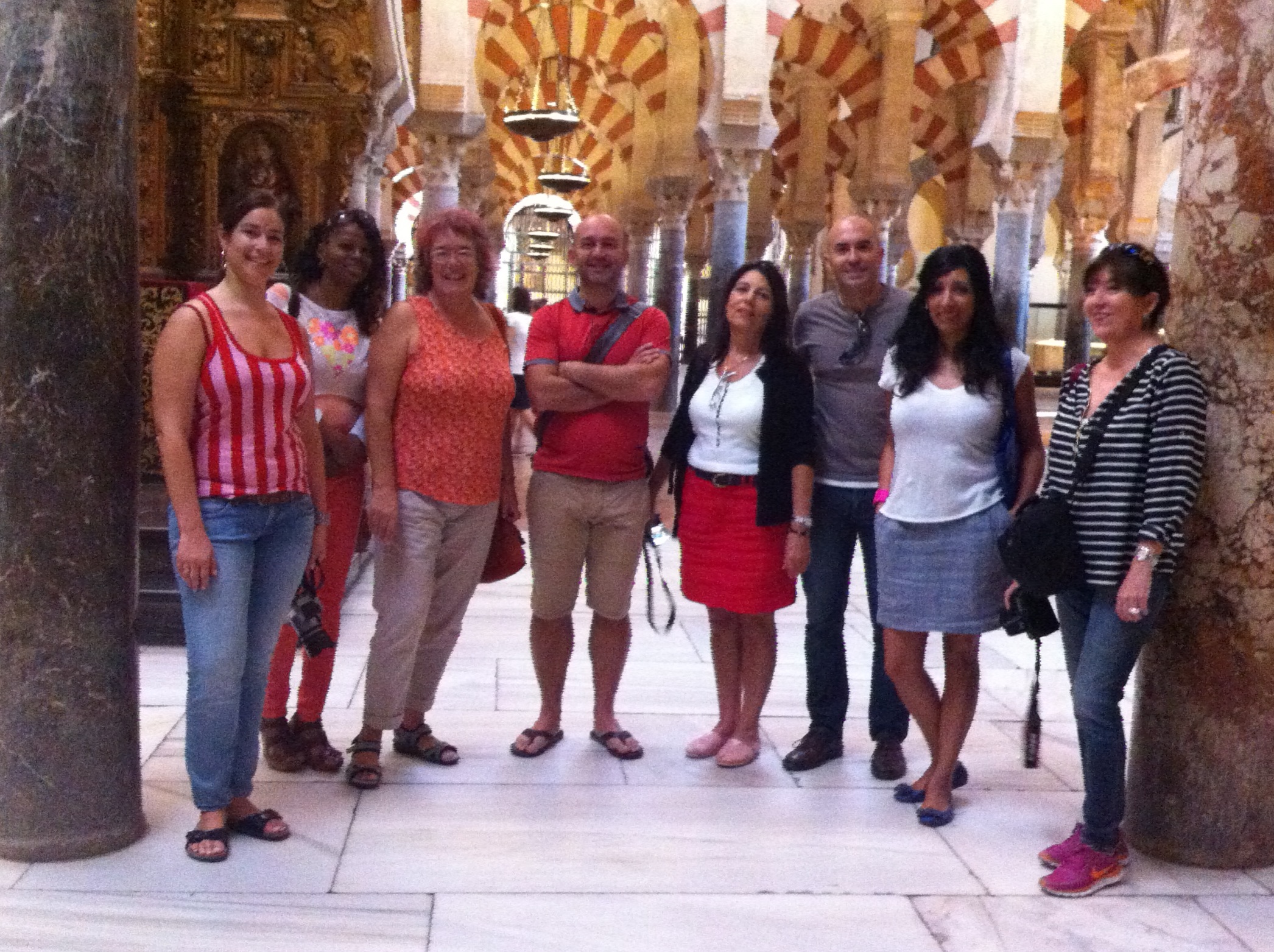 cathedral inside a mosque. But through Rafa's quiet knowledgeable explanation, I came to understand another perspective. "Where else is there a Mezquita like this, in Spain or anywhere else?" asked Rafa. As you walk around any great Spanish city, wherever you see a cathedral or a great church, below it and before it was a mosque, ripped down to stamp Christianity's mark. But uniquely, the beautiful Mezquita of Córdoba, the jewel of Islamic western culture, was saved. And it was saved because Carlos V agreed to the plans to build a cathedral inside it. So it's true, what they say - "Conversation is where you get to change your mind." I still find the cathedral uncomfortably invasive, but if its presence saved the mosque then it was a price (possibly) worth paying. cathedral inside a mosque. But through Rafa's quiet knowledgeable explanation, I came to understand another perspective. "Where else is there a Mezquita like this, in Spain or anywhere else?" asked Rafa. As you walk around any great Spanish city, wherever you see a cathedral or a great church, below it and before it was a mosque, ripped down to stamp Christianity's mark. But uniquely, the beautiful Mezquita of Córdoba, the jewel of Islamic western culture, was saved. And it was saved because Carlos V agreed to the plans to build a cathedral inside it. So it's true, what they say - "Conversation is where you get to change your mind." I still find the cathedral uncomfortably invasive, but if its presence saved the mosque then it was a price (possibly) worth paying.
The week's itinerary included visits to countless hidden corners of the city, plus a day-trip to Sevilla, a morning at 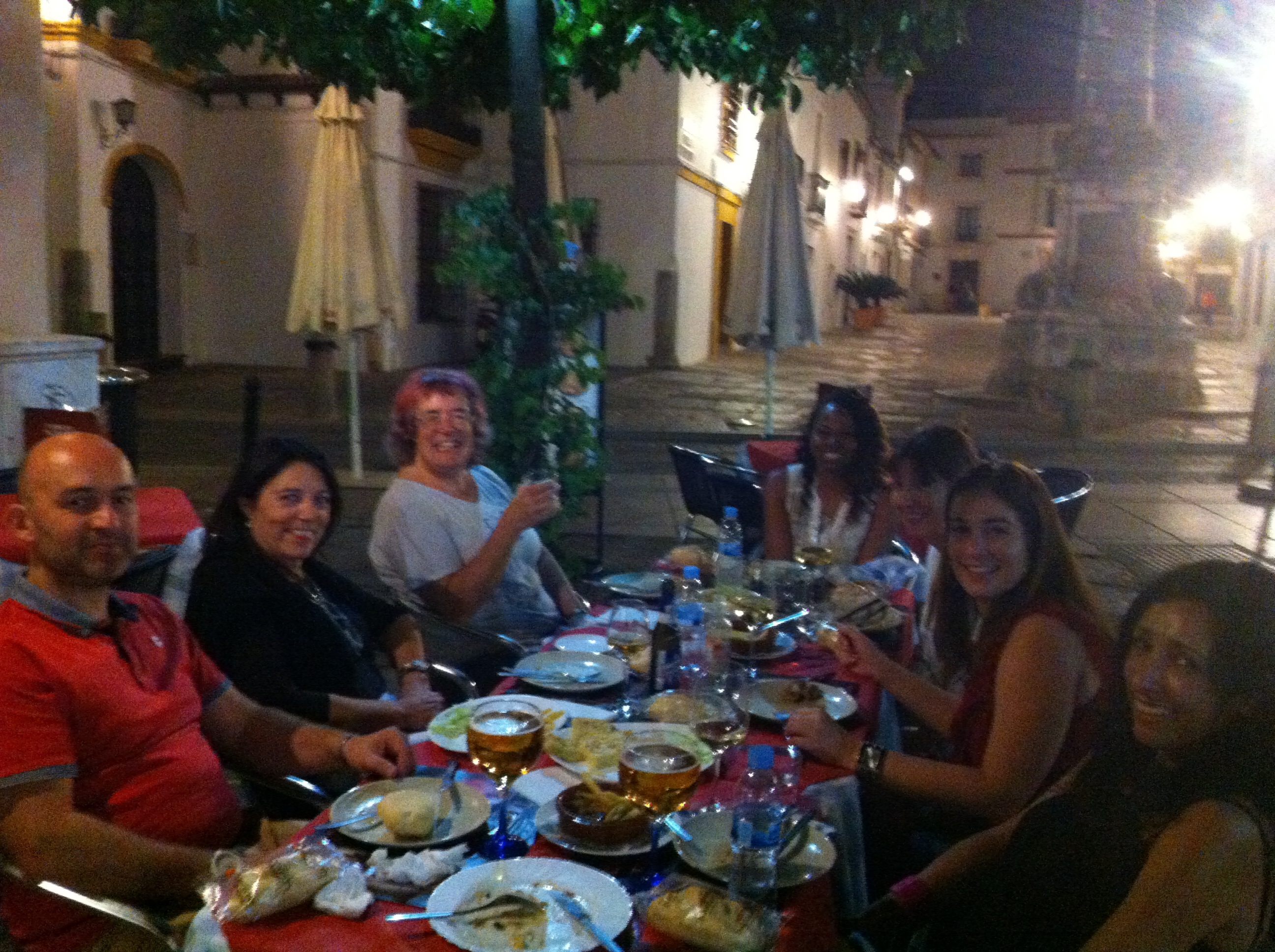 the ancient ruined city of Medinat al-Zahra, and the rural day out at the olive plantation and the dehesa about which I wrote in October (Of Acorns, Olives, and Old-Andaluz). . And food. It included lots of food. Lunch in a restaurante wherever we happened to be. 15€ in the kitty to cover an enormous amount of shared platters and our drinks. Same again in the evening. Coffees somewhere in the morning, and again in the afternoon. Ice-creams while walking back to the hotel. And always money left over. One night we hit a night-club high above the river and overlooking the Roman bridge. Drinks came out of the bote. the ancient ruined city of Medinat al-Zahra, and the rural day out at the olive plantation and the dehesa about which I wrote in October (Of Acorns, Olives, and Old-Andaluz). . And food. It included lots of food. Lunch in a restaurante wherever we happened to be. 15€ in the kitty to cover an enormous amount of shared platters and our drinks. Same again in the evening. Coffees somewhere in the morning, and again in the afternoon. Ice-creams while walking back to the hotel. And always money left over. One night we hit a night-club high above the river and overlooking the Roman bridge. Drinks came out of the bote.
Countless, unforgettable experiences. And all in Spanish. With our four "teachers" there not to teach formally but to correct us and help us improve. With their encouragement, chatting in the minibus and over meals, we relaxed into the language until it became more natural. Immersion works - and when it can be this much fun, it's an ideal way to take a big step forward in improving your Spanish.
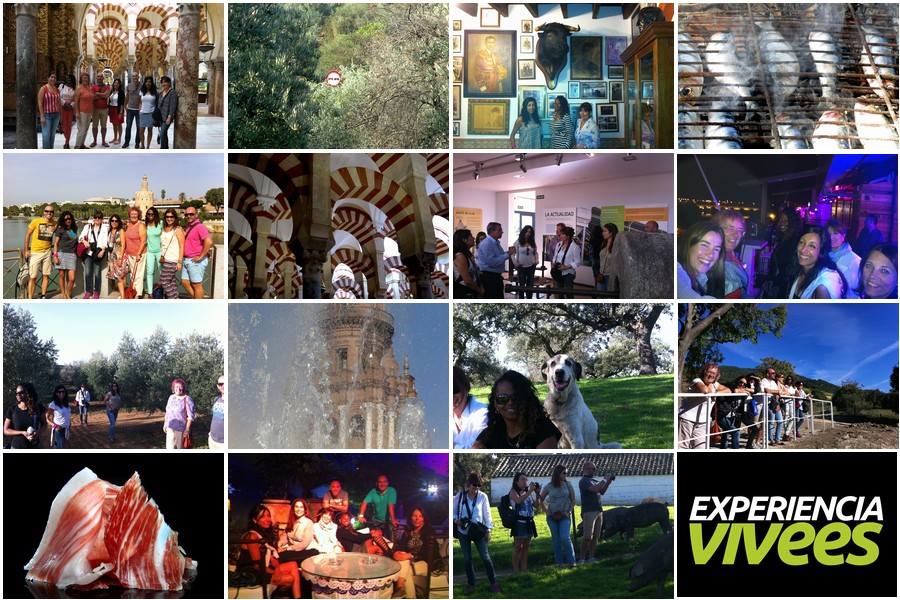
(Spanish immersion weeks based in and around Córdoba and Málaga are organised by Rafael Terán Perez of www.experienciavivees.com. Dates for 2015 are now available. All opinions are my own!)
© Tamara Essex 2015 http://www.twocampos.com
THIS WEEK'S LANGUAGE POINT:
All the language points now up to date - ALL THE LANGUAGE POINTS
And as a few people had requested, each language point now has a link back to the original article, as there is often a discussion about the language point in the comments. I hope that it's useful!
 0
Like
Published at 3:30 PM Comments (3)
0
Like
Published at 3:30 PM Comments (3)
131 - Sunburnt Angels
Thursday, January 8, 2015
Do angels get sunburn? Sounds like a deep philosophical question. It's not, and the answer is yes, they do. Even in winter.
Fifth of January and the alarm went off early. Apart from an occasional early flight, my alarm clock doesn't get used much (it retired about the same time I did, two years ago). It was still pitch black outside as I downed a quick coffee, swallowed a slice of toast, and drove past the Casabermeja bull with an almost-full moon behind it. The sun rose as I passed Málaga FC's Rosaleda Stadium, and it was light as I parked near the dry riverbed and hurried to the portakabins of Los Ángeles Málagueños de La Noche.
The serious volunteers, those with far more commitment than me, were already there. Ana was wielding the slicing machine, Carmén was ferrying the slices of sausage and mortadella to where Mari-Jose was supervising the sandwich-making. On a separate counter, different volunteers made up the Muslim and vegetarian breakfast bags, avoiding pork and other meat products. I mixed the Cola-Cao hot chocolate drink and distributed cups to the volunteers before filling the jugs to take out to the gathering queue.
At 8.30 the breakfast queue began to file past. A bag of mixed sandwiches, a cup of hot chocolate, and a few loaves of bread to take away. Extra bread today as there would be no lunch. Although the sun was up it was a cold morning and people rejoined the queue a second time to get a second cup of cola-cao, receiving a sympathetic grin and half a packet of plain biscuits to go with it.
The usual volunteers' breakfast after service was rushed. Today, everything was different. Sweeping up, cleaning 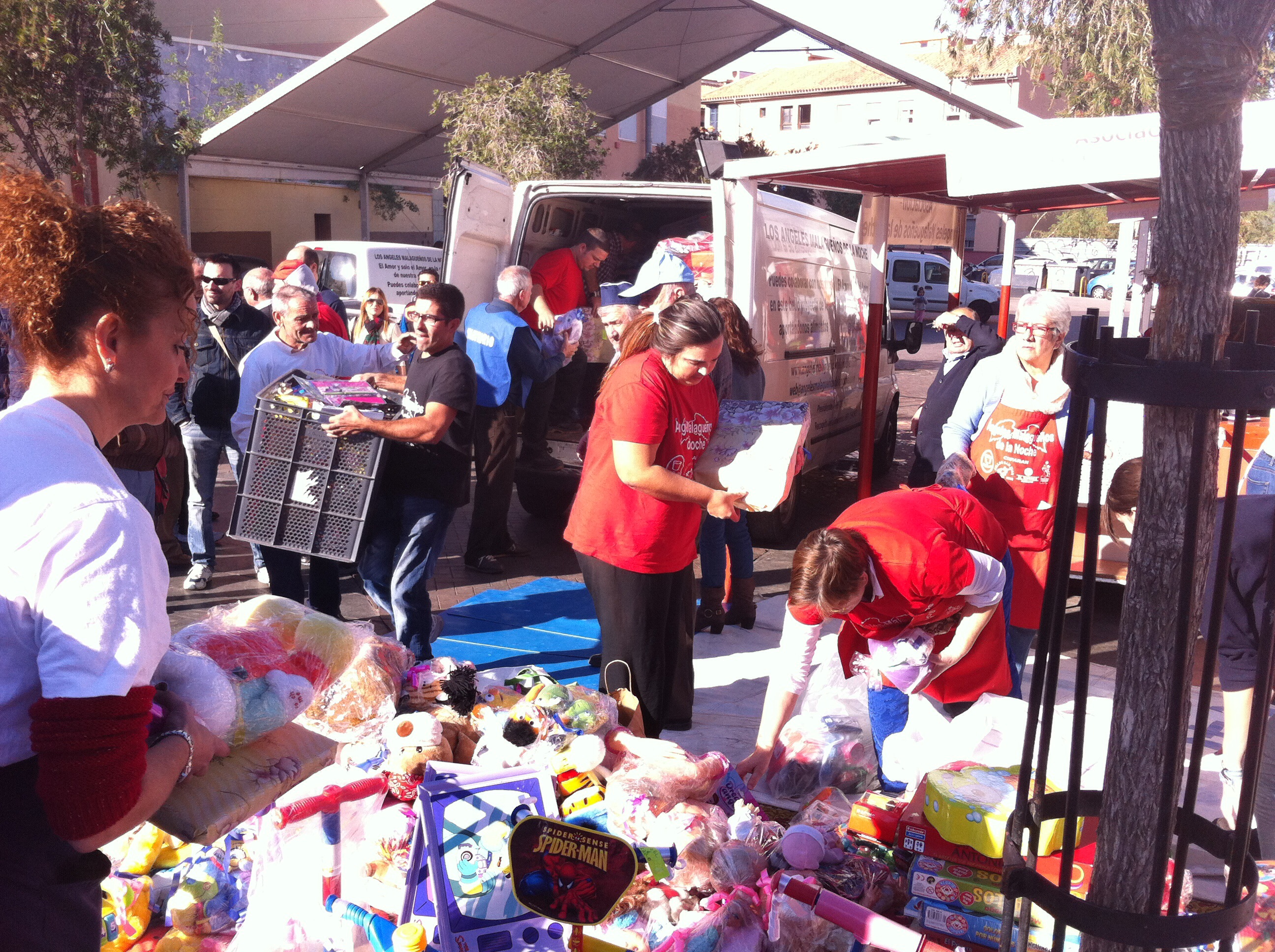 the caseta, wiping down the service area, everyone was pressed into action. Barriers were reconfigured, and the families waiting with nervous excitement were shuffled round to begin a new queue beside the river. With space in front of the caseta, the first van arrived from the almacen (warehouse). Sisi was in charge today, and he directed operations quickly, getting carpet laid and then the first mountain of presents unloaded. Many children had delivered their letters to the Three Kings a few days earlier, and those children had a carrier bag marked with their names. the caseta, wiping down the service area, everyone was pressed into action. Barriers were reconfigured, and the families waiting with nervous excitement were shuffled round to begin a new queue beside the river. With space in front of the caseta, the first van arrived from the almacen (warehouse). Sisi was in charge today, and he directed operations quickly, getting carpet laid and then the first mountain of presents unloaded. Many children had delivered their letters to the Three Kings a few days earlier, and those children had a carrier bag marked with their names.
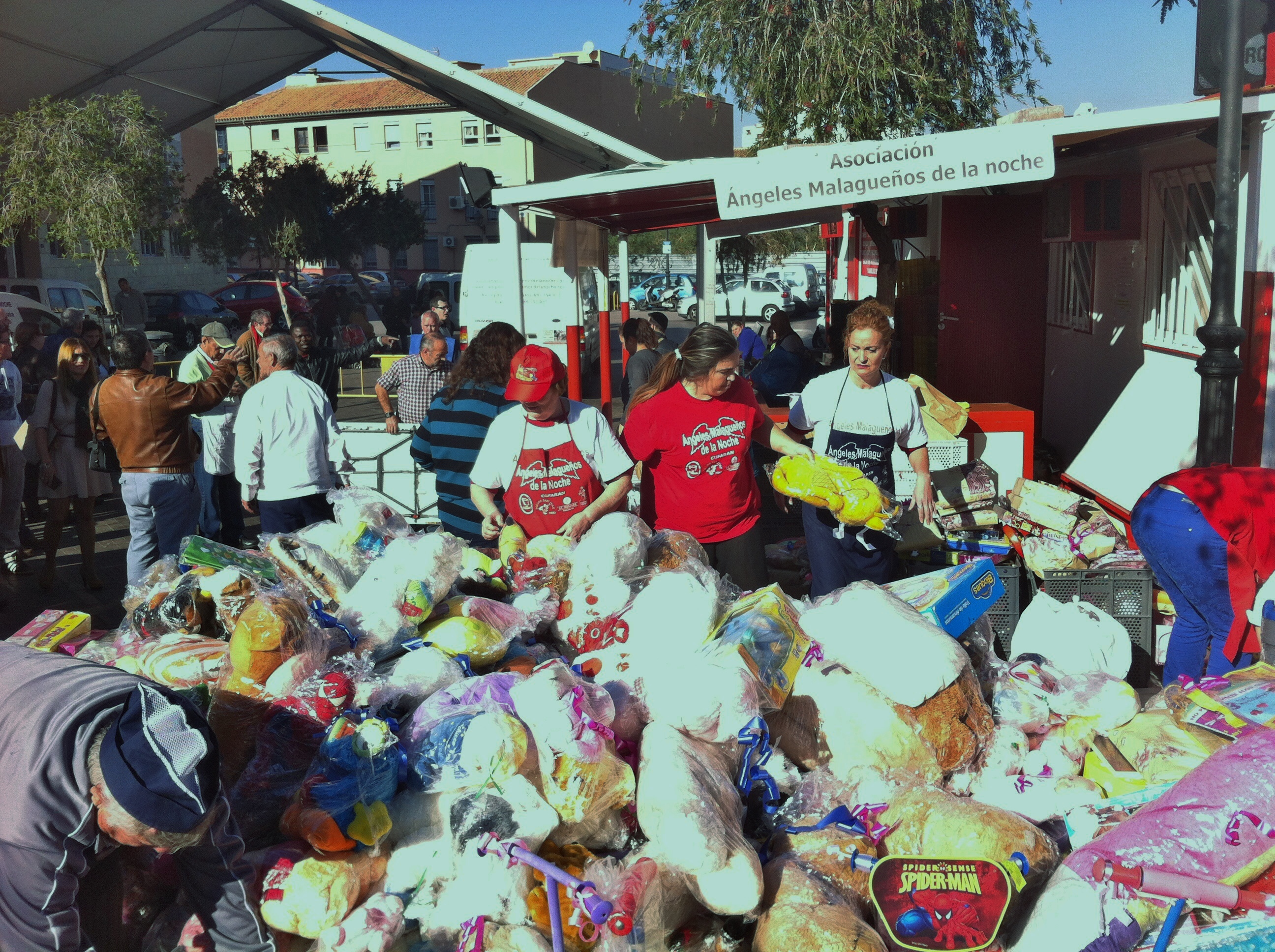 A tug on my apron. Milagro was a beautiful little girl of about seven, who shyly handed me her letter. "Para Los Reyes Magos" she said. In the caseta I opened the letter along with the other Tamara, my co-worker. Milagro had asked for some colouring pencils, a Barbie doll, anything connected with Monster High, and an iPad. A girl with class - not just ANY old tablet would do! We scurried around and found a Barbie doll. I added a little Barbie child's handbag, a set of pencils and a drawing book. The other Tamara squealed with delight as she unearthed a better drawing pad with Monster High on the front. Milagro was in luck (albeit without an iPad this year). Hers was the last carrier bag to be added to the heap for the Kings to distribute. A tug on my apron. Milagro was a beautiful little girl of about seven, who shyly handed me her letter. "Para Los Reyes Magos" she said. In the caseta I opened the letter along with the other Tamara, my co-worker. Milagro had asked for some colouring pencils, a Barbie doll, anything connected with Monster High, and an iPad. A girl with class - not just ANY old tablet would do! We scurried around and found a Barbie doll. I added a little Barbie child's handbag, a set of pencils and a drawing book. The other Tamara squealed with delight as she unearthed a better drawing pad with Monster High on the front. Milagro was in luck (albeit without an iPad this year). Hers was the last carrier bag to be added to the heap for the Kings to distribute.
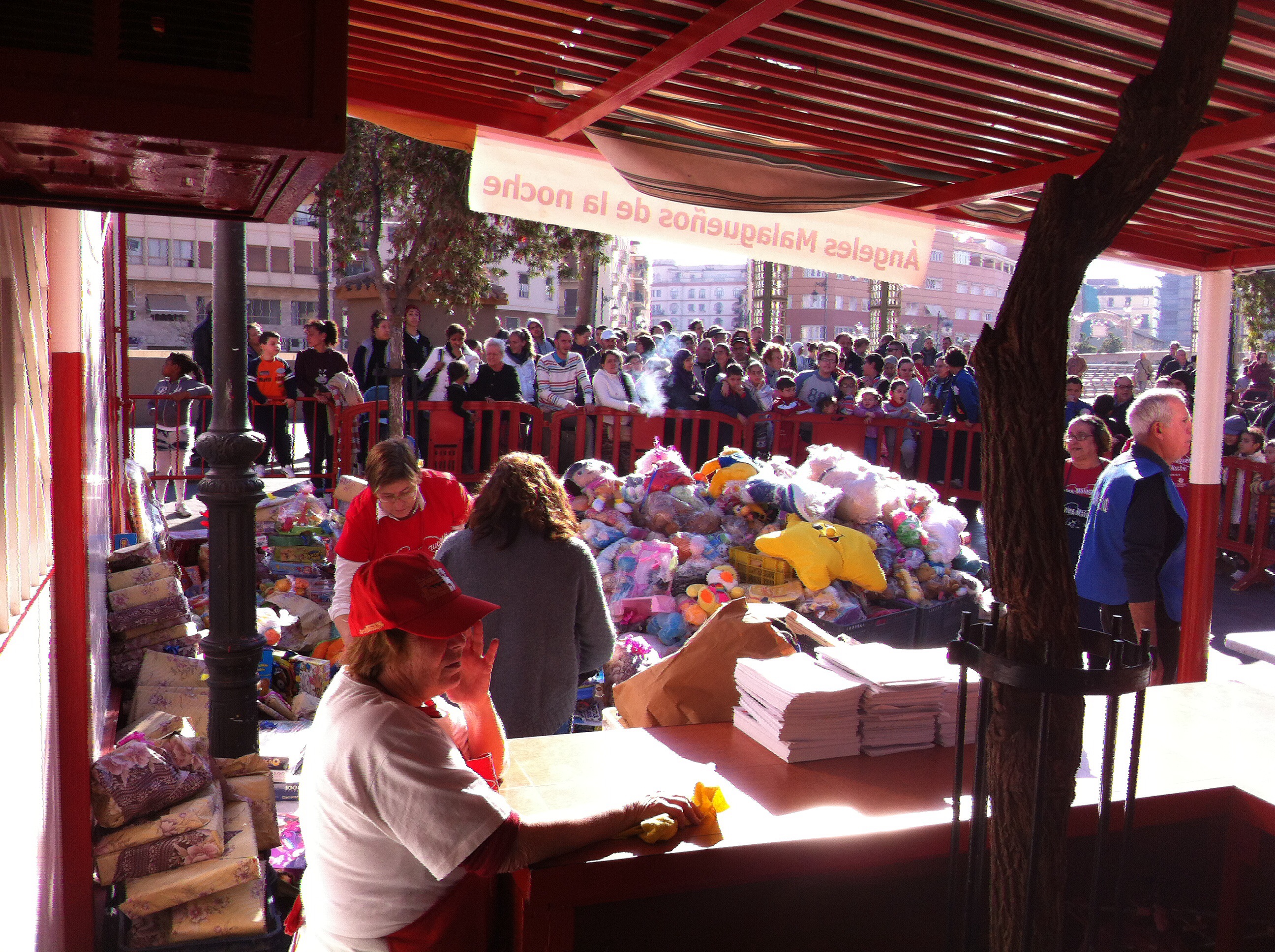 Antonio, the president of Los Ángeles, arrived and, as always, got stuck straight in piling presents and moving barriers. I was introduced to him, and was overheard by a reporter from Diario Sur who pulled me away for a quick interview as to why an extranjera had chosen this particular charity with which to volunteer. A VERY easy question, fortunately, for my first ever radio interview in Spanish! Antonio, the president of Los Ángeles, arrived and, as always, got stuck straight in piling presents and moving barriers. I was introduced to him, and was overheard by a reporter from Diario Sur who pulled me away for a quick interview as to why an extranjera had chosen this particular charity with which to volunteer. A VERY easy question, fortunately, for my first ever radio interview in Spanish!
Now, the van arrived for the second time, bringing more of the precious gifts, as 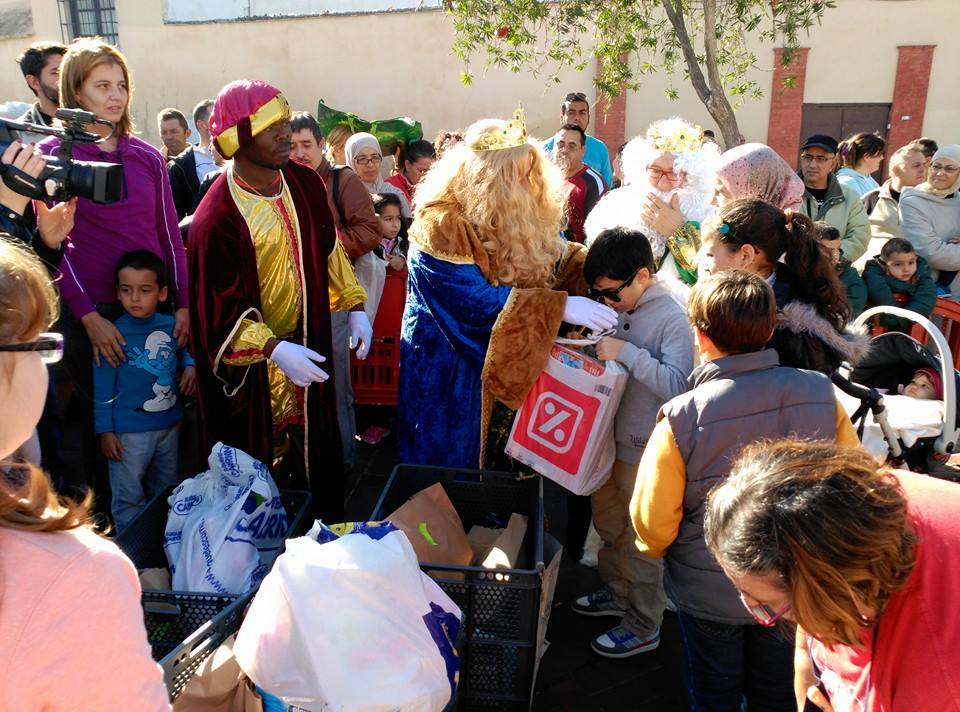 the queue grew and the children nearer the back looked anxious. The tables groaned under the heaps of gifts. Boxes of chocolates and individually-wrapped biscuits were opened and tipped into trays. All was set. The loudspeakers announced the arrival of the Three Kings (two of whom were actually queens, though the big beards were a good disguise). The children who had written letters got their personalised carrier bags from the Kings, and everybody got three or four presents to take away, including extras for children who couldn't attend. the queue grew and the children nearer the back looked anxious. The tables groaned under the heaps of gifts. Boxes of chocolates and individually-wrapped biscuits were opened and tipped into trays. All was set. The loudspeakers announced the arrival of the Three Kings (two of whom were actually queens, though the big beards were a good disguise). The children who had written letters got their personalised carrier bags from the Kings, and everybody got three or four presents to take away, including extras for children who couldn't attend.
At the end of the line of tables, handfuls of chocolates were tipped into waiting pockets or bags. A young volunteer asked me how we knew whether someone really did have three children waiting in a hostel, as the last person had said. "Nos importa?" I asked her - do we care? If someone will stand in line for up to two hours, whether it be for a breakfast bag of filled rolls, a plate of stew at lunchtime, or a gift of donated presents, they are welcome.
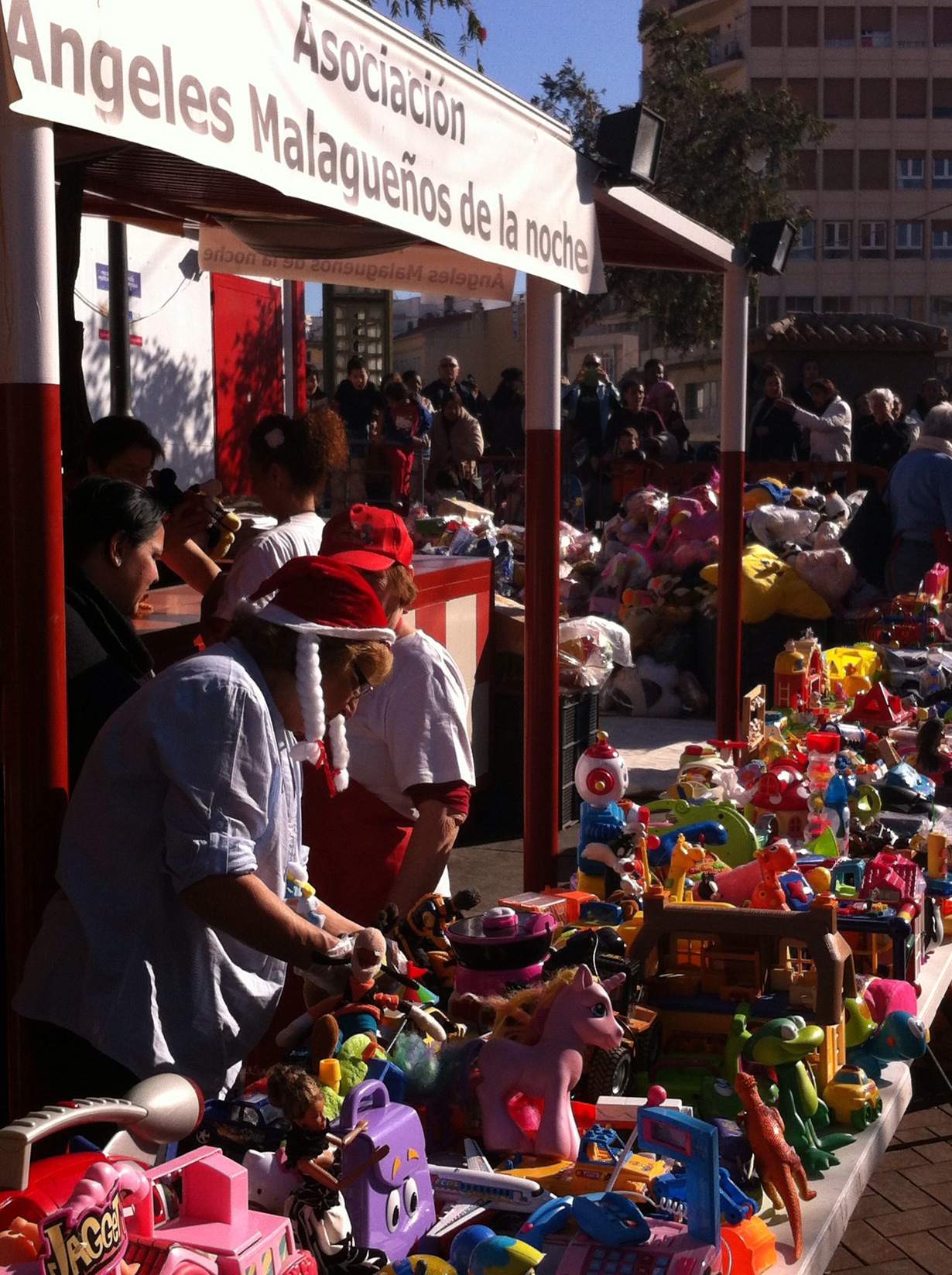 As the heaps on the tables diminished, more boxes were brought from the portakabin. Some of the best gifts, held back so that those at the back didn't get a raw deal. A boy was searching for a football. Together we walked up and down the length of the tables without success. I told him that next year he must write to the Kings in advance. "Yes" agreed his father. "Though I truly hope we won't be coming here for presents next year." Then he apologised profusely, "I didn't mean to be rude - it's amazing what you all do. God bless you all, you really are angels, I'm sorry." "That's OK" I reassured him. "I understand. Best wishes for 2015, and I hope NOT to see you next year!" He understood my Spanish despite my foreign accent and laughed. "This must be the only place where people really value what you do, but hope never to see you again," he said thoughtfully. He guided his son towards the chocolates, and the lad's mood brightened a little. "But be careful" said his father to me and the other Tamara by my side, "You're getting sunburnt." As the heaps on the tables diminished, more boxes were brought from the portakabin. Some of the best gifts, held back so that those at the back didn't get a raw deal. A boy was searching for a football. Together we walked up and down the length of the tables without success. I told him that next year he must write to the Kings in advance. "Yes" agreed his father. "Though I truly hope we won't be coming here for presents next year." Then he apologised profusely, "I didn't mean to be rude - it's amazing what you all do. God bless you all, you really are angels, I'm sorry." "That's OK" I reassured him. "I understand. Best wishes for 2015, and I hope NOT to see you next year!" He understood my Spanish despite my foreign accent and laughed. "This must be the only place where people really value what you do, but hope never to see you again," he said thoughtfully. He guided his son towards the chocolates, and the lad's mood brightened a little. "But be careful" said his father to me and the other Tamara by my side, "You're getting sunburnt."
Nice guy. With all his problems, the scale of which we would never know, he still had it in him to care for the strangers who hadn't been able to dig out a football for his son. I could feel the emotion pricking behind my eyes. "Wait," I said. I dived into the caseta and launched into a complex negotiation with Mari-Jose, who I knew had tucked a football aside that morning for another volunteer's grandson. I promised to replace it, if I could have this one now for the boy. She could see I was serious and she handed it over.
My nose was burning and my feet were screaming in agony after seven hours non-stop. Everything hurt. Then the boy saw me emerge from the caseta with a football. He looked at his father, not daring to believe ..... and when he slowly took it from my hands, as though it was worth a million euros, his eyes like saucers, barely able to stutter his thanks, all of a sudden nothing hurt any more.
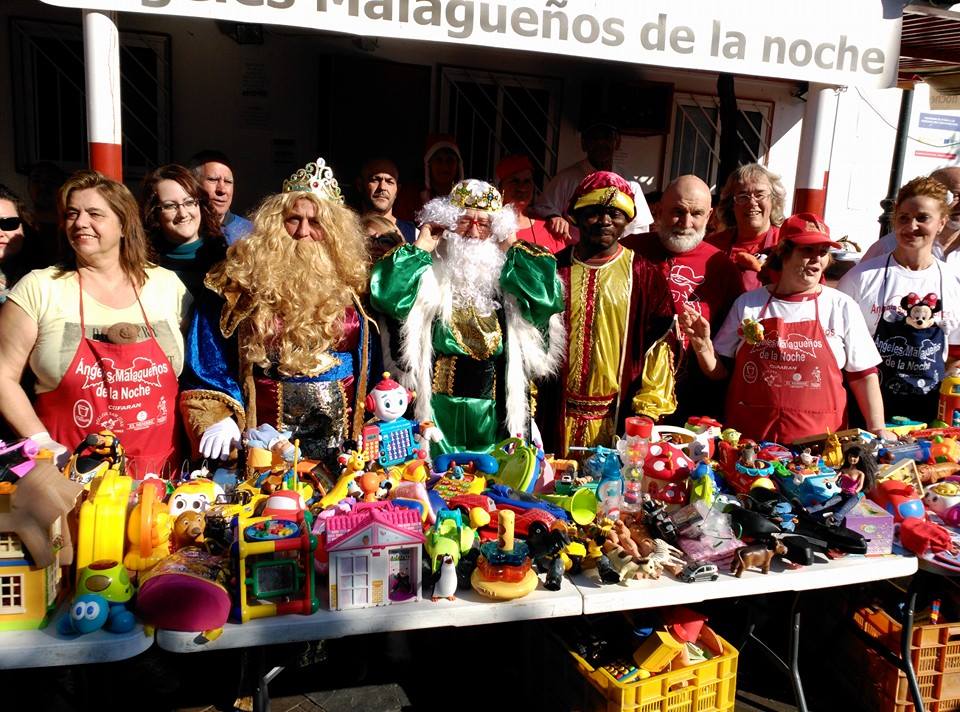
© Tamara Essex 2015
http://www.twocampos.com
THIS WEEK'S LANGUAGE POINT:
Just a general tip this time. I was given a Spanish dictionary a couple of months ago for my birthday. Not a Spanish-English dictionary, just a Spanish dictionary. You look up a Spanish word, and in Spanish it explains the meaning. I love it! It is a massive step forward! When reading a newspaper article or a book in Spanish, and there’s a word I don’t know that looks important enough to be needed for the sense of whatever I’m reading, looking up a Spanish definition avoids translating back and forth into English, it keeps the flow, enabling me to continue to think and understand in Spanish. Wouldn’t work for complete beginners, but for anyone trundling along at my sort of level, B1 and working towards B2, I thoroughly recommend it.
 0
Like
Published at 9:34 PM Comments (0)
0
Like
Published at 9:34 PM Comments (0)
130 - A Village Christmas in Spain
Thursday, January 1, 2015
Poco a poco, paso por paso .... Little by little, step by step. Each Christmas and New Year in a new country represents another step forward in learning about and understanding my new environment. The first Christmas day here, I went to a lovely English-run bar for turkey and all the English trimmings. The second, I stayed with an English friend in a Spanish hotel, and we had a traditional Spanish Christmas Eve dinner AND a traditional English Christmas Day lunch! Followed by a German-style enormous buffet meal that evening! This year, Christmas number three, was a strange mixture of Spanish, Argentinian and English traditions at home.
Christmas began early with the annual community breakfast in the next village, Riogordo, where I attend Spanish lessons. The Adult Education centre there is thriving, with Spanish elders taking basic maths and literacy, to catch them up on lost years of education. Another group takes English lessons, and there are two big multi-cultural groups of extranjeros taking either beginners' Spanish or intermediate. The whole Adult Ed centre gets together for a community breakfast on the last day of term, and each class had prepared some music to perform.
We had each brought something traditional from our own country to share. A Dutch woman had made special Dutch cakes, I brought English teabags (!), someone else brought crumpets, there were treats from Germany, Iran, Ireland, 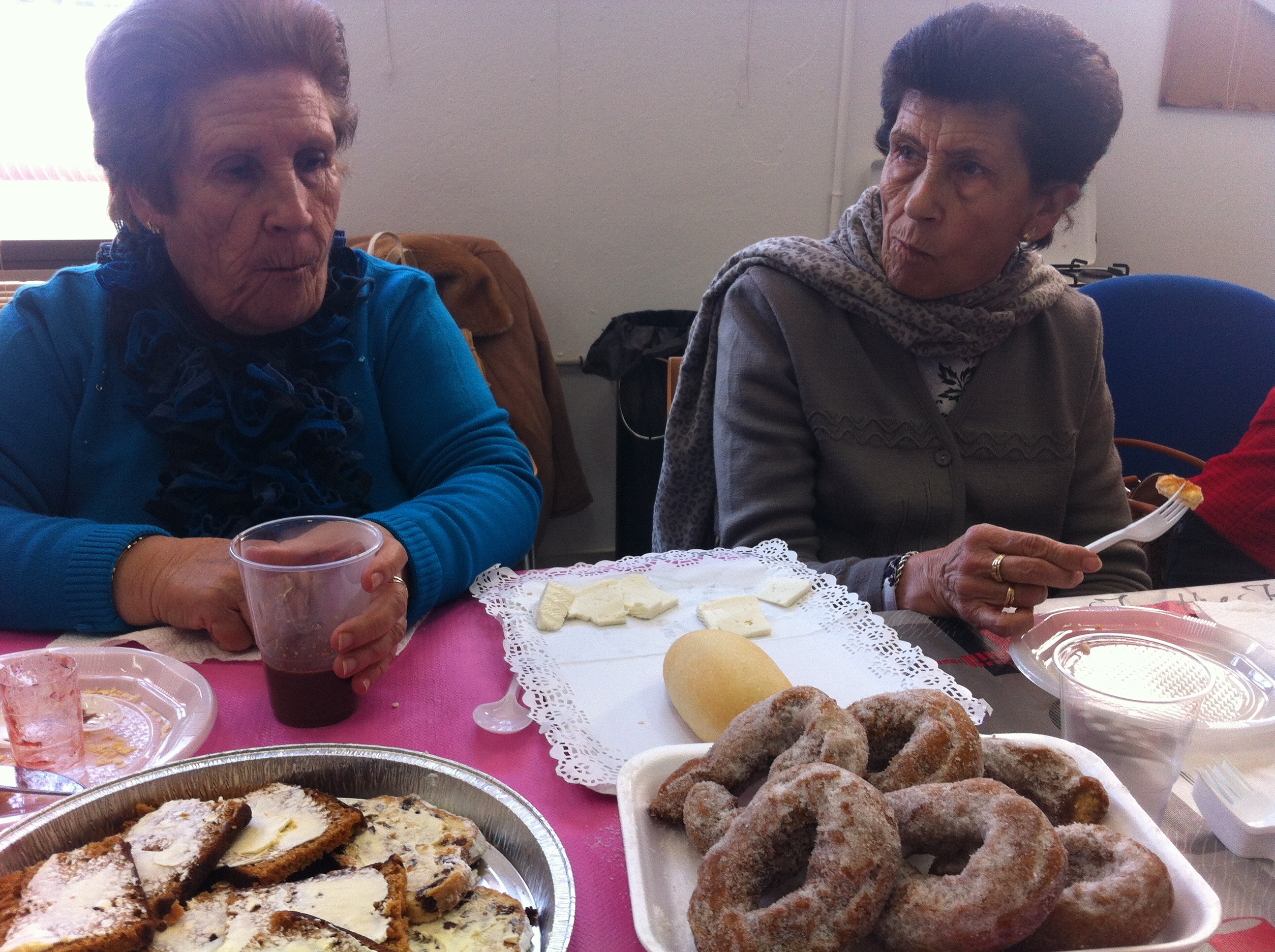 and of course huge mountains of Spanish roscos, cakes, cheese, hot chocolate and coffee. I plonked myself down next to Francisca, a Spanish lady of about 80 who was studying maths and reading. She looked suspiciously at the crumpets, and instead produced a tray of roscos she had made, and commandeered the thermos of hot chocolate. She had lived in Riogordo all her life, though proudly told me that her mother had once spent a year living in the province of Granada. "She was very adventurous" said Francisca. and of course huge mountains of Spanish roscos, cakes, cheese, hot chocolate and coffee. I plonked myself down next to Francisca, a Spanish lady of about 80 who was studying maths and reading. She looked suspiciously at the crumpets, and instead produced a tray of roscos she had made, and commandeered the thermos of hot chocolate. She had lived in Riogordo all her life, though proudly told me that her mother had once spent a year living in the province of Granada. "She was very adventurous" said Francisca.
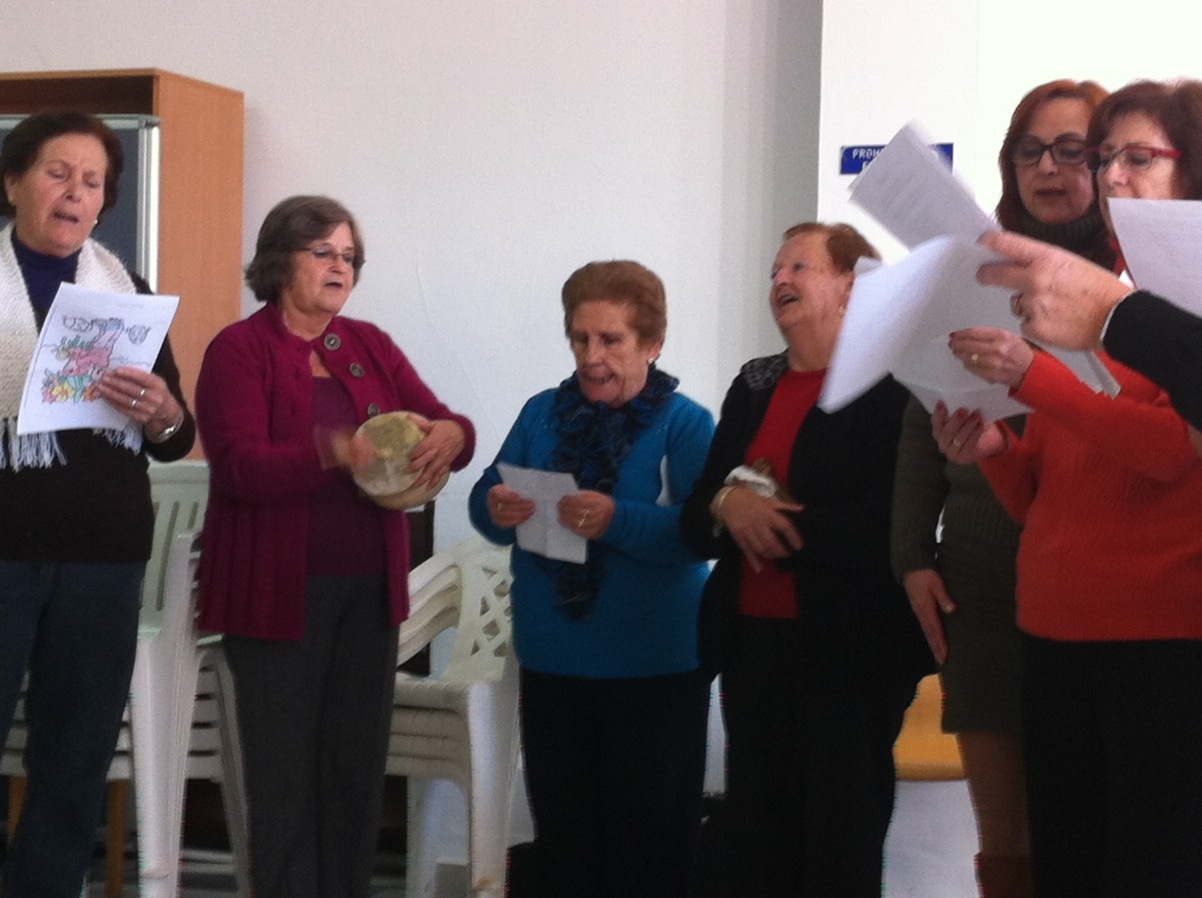 When it was time for the singing, Francisca's group lustily sang vilancicos accompanied by the strange indescribable sounds of the zambomba, a hand-made gourd played by plunging a stick in and out of a tight hole. Well the truth is, the sound is NOT indescribable - but to describe it would be to admit it sounds When it was time for the singing, Francisca's group lustily sang vilancicos accompanied by the strange indescribable sounds of the zambomba, a hand-made gourd played by plunging a stick in and out of a tight hole. Well the truth is, the sound is NOT indescribable - but to describe it would be to admit it sounds 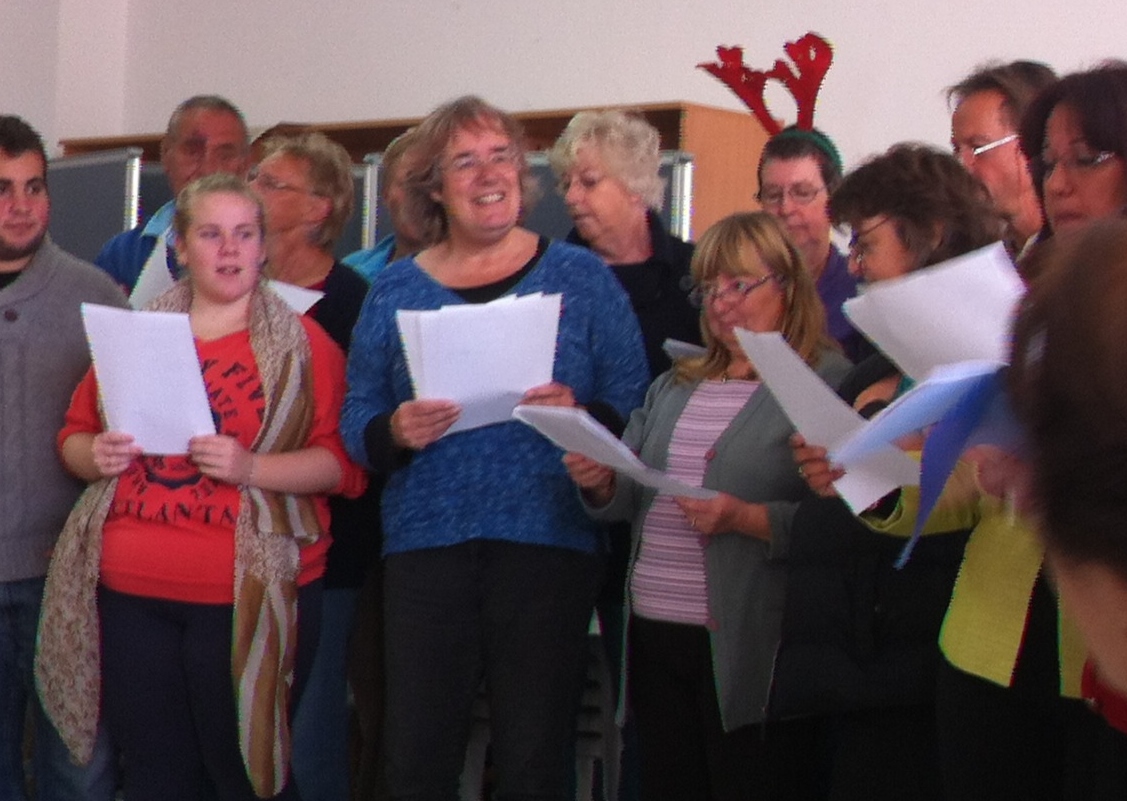 like nothing more than a loud fart, so it is really best left undescribed. Our group sang a couple of English-language carols and a couple with Spanish verses. Then the Spanish women burst into rounds of "Ande, Ande, Ande" from the tables, random people taking a verse, and us all joining in on the chorus "Ande, ande ande, la Marimorena, Ande ande ande es la Nochebuena." like nothing more than a loud fart, so it is really best left undescribed. Our group sang a couple of English-language carols and a couple with Spanish verses. Then the Spanish women burst into rounds of "Ande, Ande, Ande" from the tables, random people taking a verse, and us all joining in on the chorus "Ande, ande ande, la Marimorena, Ande ande ande es la Nochebuena."
It was a lovely morning, sharing food and songs across cultures, and despite being an extranjera (being from Colmenar, instead of Riogordo) I felt very included in their village celebration.
Argentinian Christmas traditions arrived on Christmas Eve (la Nochebuena) with a huge meal cooked out on the terrace on the barbecue at 10pm while the Colmenar fireworks soared above us in the night sky. I added cauliflower cheese to the meal to bring something of England to the table! Two days later an even bigger session at the barbecue included an entire leg of lamb, cooked to perfection. New ways of doing things - I think I've reached the stage now where nothing surprises me, I'll just go with the flow.
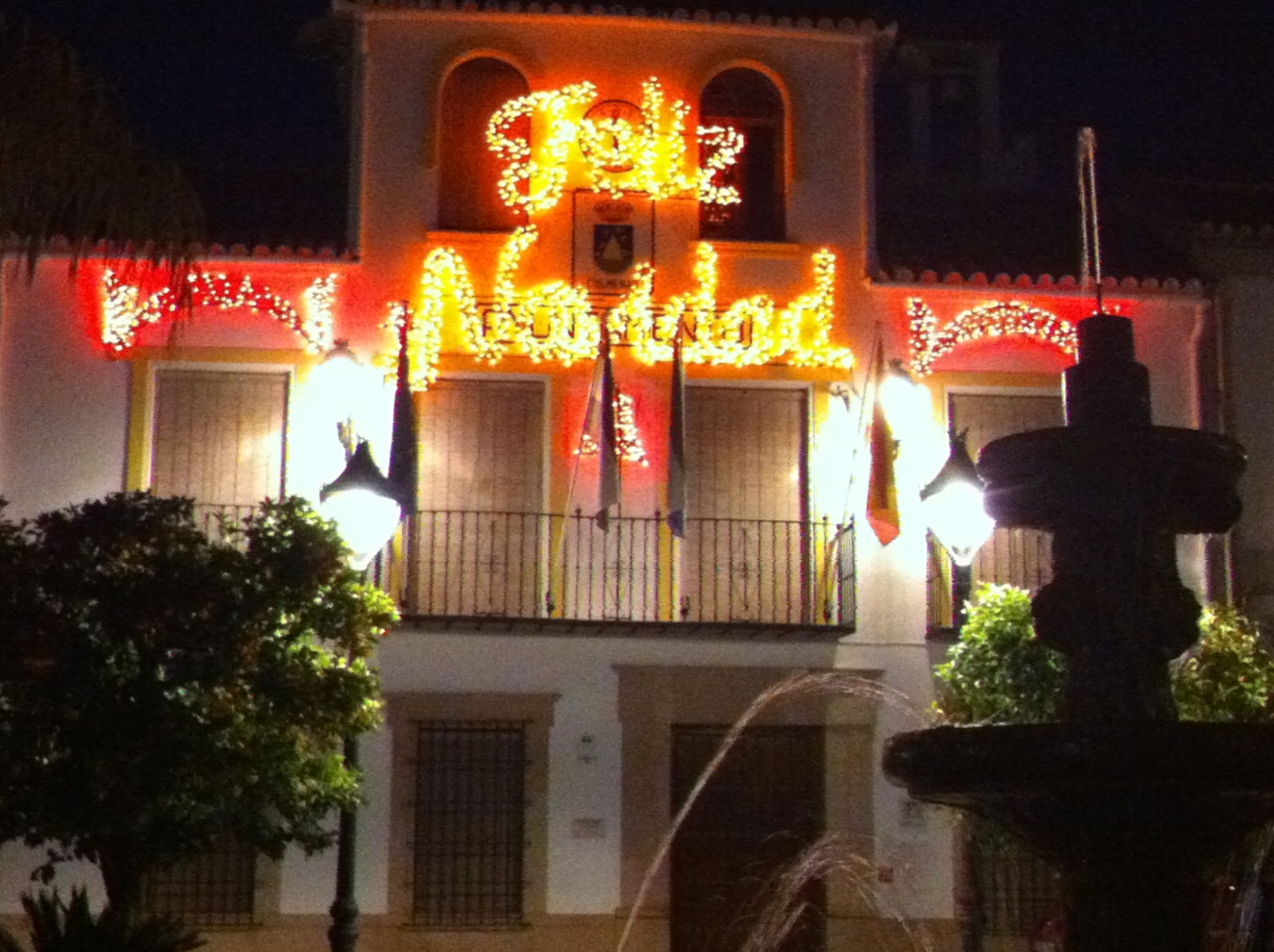 Long walks in the woods and the mountains, hot chocolate under the village Christmas lights, fried bread in the neighbour’s kitchen, watching the International Space Station go overhead from the Jacuzzi, and eating twelve lucky grapes at midnight on New Year's Eve. Málaga may have the spectacular Christmas lights, but Colmenar is home. Long walks in the woods and the mountains, hot chocolate under the village Christmas lights, fried bread in the neighbour’s kitchen, watching the International Space Station go overhead from the Jacuzzi, and eating twelve lucky grapes at midnight on New Year's Eve. Málaga may have the spectacular Christmas lights, but Colmenar is home.
© Tamara Essex 2015 http://www.twocampos.com
THIS WEEK'S LANGUAGE POINT:
"Noche de Paz" is sung to the tune of "Silent Night", though the words are not a translation of the English nor of the original German, more a free composition along the same theme ….. (is Spanish the ONLY language that has a decent word to rhyme with “Jesus”?):
Noche de paz, noche de amor, Todo duerme en derredor,
Entre los astros que esparcen su luz,
Bella anunciando al niñito Jesús,
Brilla la estrella de paz, brilla la estrella de paz.
Noche de paz, noche de amor, ved que bella resplandor,
Luz en el rostro del niño Jesús,
En el pesebre de mundo la luz,
Astro de eterno fulgor, astro de eterno fulgor.
Noche de paz, noche de amor, oye humilde el fiel pastor,
Como celestes que aclaman salud,
Gracias y glorias en gran plenitud,
Por nuestro buen redentor, por nuestro buen redentor.
 2
Like
Published at 4:59 PM Comments (1)
2
Like
Published at 4:59 PM Comments (1)
Spam post or Abuse? Please let us know
|
|